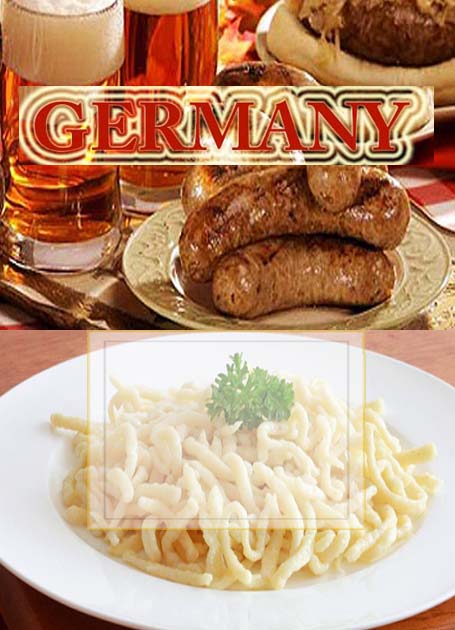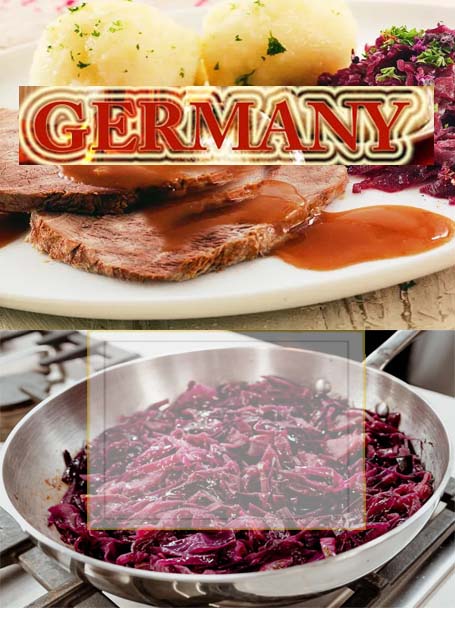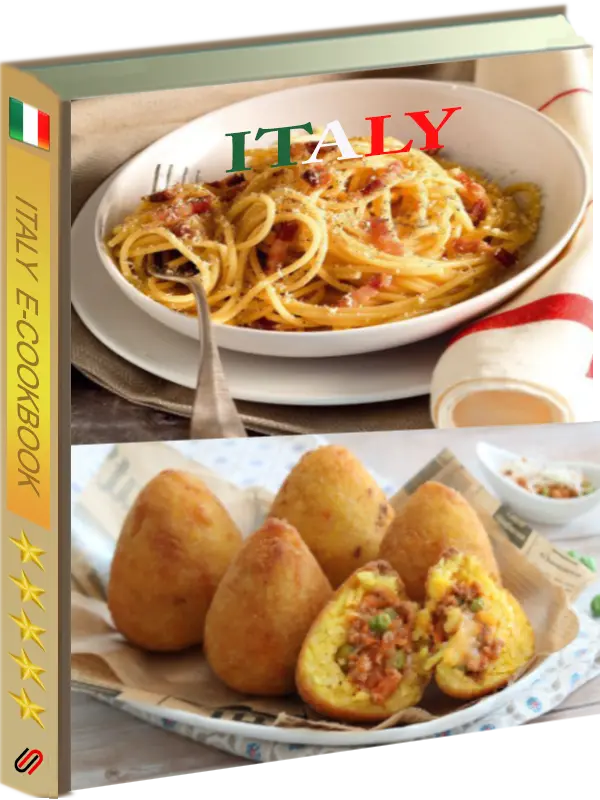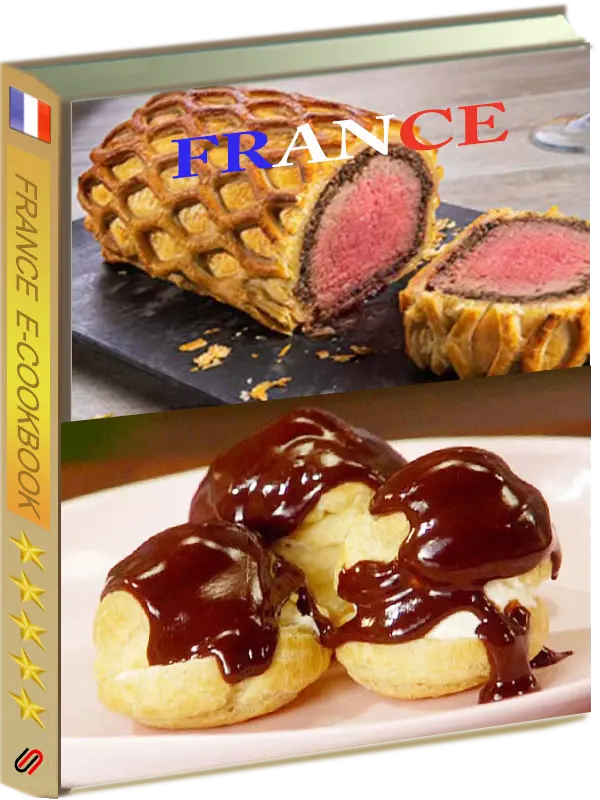germany Is My Kitchen
GERMANY Breakfast Appetizers & Soups
Weight & temperature Measures
non-liquid ingredients
Top 5 countries
Last Page
Braised red cabbage
Braised red cabbage with red wine and apples
Broccoli cauliflower gratin
Broccoli stems cabbage slaw
Brussels Sprout and radicchio Slaw
Chicken liver mousse
Creamy cauliflower purée
German spaetzle
Ham and cheese toast
Herb roasted potatoes
Leeks au gratin
Marinated onions
Mixed cabbage salad
Onion braid
Potato cake
Roasted brussel sprouts with feta
Warm brussels sprout salad
GERMANY Main Dishes
Braised endives in beer
Grilled pork chops with red onion marmalade
Jaeger schnitzel
Old fashion beef stew
Potato cake
Puff pastry rochoises
Roast loin of pork with prunes
Seared chicken breast with red onion vinaigrette
Split pea soup
Tarragon roasted chicken
Winter squash soup
GERMANY Desserts
Grilled pork chops with red onion marmalade
Jaeger schnitzel
Old fashion beef stew
Potato cake
Puff pastry rochoises
Roast loin of pork with prunes
Seared chicken breast with red onion vinaigrette
Split pea soup
Tarragon roasted chicken
Winter squash soup
Apple cake
Apple sauce cake
Apple strudel
Banana cake
Bee sting cake or bienenstich
Blackberry mousse terrine
Blueberry basic pie filling
Chocolate almond cake
Chocolate creme caramel
Chocolate mocha torte
Cider apples
Country apple cake
Dutch apple pie
Flambeed bananas
Flamed apples
Jelly-filled pears in puff pastry with caramel sauce
Meringue apple tart
Peach-raspberry beggars purses
Poppy seed chocolate torte
Prune kumquat sticky pudding with armagnac toffee sauce
Prune soufflés
Rhubarb tart with orange-ginger glaze
Strawberry linzertorte
Vanilla custards
Whipped cream chocolate icing
liquid MeasuresApple sauce cake
Apple strudel
Banana cake
Bee sting cake or bienenstich
Blackberry mousse terrine
Blueberry basic pie filling
Chocolate almond cake
Chocolate creme caramel
Chocolate mocha torte
Cider apples
Country apple cake
Dutch apple pie
Flambeed bananas
Flamed apples
Jelly-filled pears in puff pastry with caramel sauce
Meringue apple tart
Peach-raspberry beggars purses
Poppy seed chocolate torte
Prune kumquat sticky pudding with armagnac toffee sauce
Prune soufflés
Rhubarb tart with orange-ginger glaze
Strawberry linzertorte
Vanilla custards
Whipped cream chocolate icing
Weight & temperature Measures
non-liquid ingredients
Top 5 countries
Last Page
Regional Specialties
Each region in Germany has its own specialties and variations. The southern region of Germany share many specialties that reach over to Austria and Switzerland. In the southwest, cooking is greatly influenced by French cooking. Cooking in the eastern region has more of an Eastern European flavor. There are also foods that are shared by all regions, but prepared differently.
Germans love rich, hearty cuisine, though each area of Germany has its own definition of what a traditional meal looks like.
Pork is the most consumed meat, according to the German Food Guide. Schweinshaxe (braised pork hock) and Saumagen (pork stomach) are a couple of traditional pork dishes.
Bratwurst, a form of sausage, is closely associated with German food. Cabbage, beets, and turnips are commonly incorporated into meals, as they are native to the region, and potatoes and sauerkraut are also stars of German cuisine.
Almost everything begins with bread in Germany, but there are a lot of wonderful things to put on it. Sausage is definitely well associated with Germany and for good reason. Each region, and even each city, will have a particular type of Wurst that is “theirs” though the regional variations can be found all over.
Each region in Germany has its own specialties and variations. The southern region of Germany share many specialties that reach over to Austria and Switzerland. In the southwest, cooking is greatly influenced by French cooking. Cooking in the eastern region has more of an Eastern European flavor. There are also foods that are shared by all regions, but prepared differently.
Germans love rich, hearty cuisine, though each area of Germany has its own definition of what a traditional meal looks like.
Pork is the most consumed meat, according to the German Food Guide. Schweinshaxe (braised pork hock) and Saumagen (pork stomach) are a couple of traditional pork dishes.
Bratwurst, a form of sausage, is closely associated with German food. Cabbage, beets, and turnips are commonly incorporated into meals, as they are native to the region, and potatoes and sauerkraut are also stars of German cuisine.
Almost everything begins with bread in Germany, but there are a lot of wonderful things to put on it. Sausage is definitely well associated with Germany and for good reason. Each region, and even each city, will have a particular type of Wurst that is “theirs” though the regional variations can be found all over.
Appetizer Braised red cabbage 
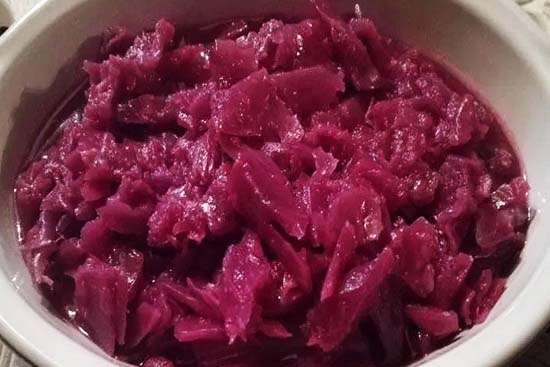
Serves: 8
Preparation time: 15 minutes
Cooking time:1 hour
1 tablespoon oil 1 medium onion, sliced
2 1/2 pounds head red cabbage
1 1/2 cups red wine vinegar
2 cups water
to taste, salt and pepper
Quarter, core and shred cabbage. Rinse under cold water. Heat oil in a dutch oven.
Add onions and sauté for 2 to 3 minutes. Stir in cabbage. Add vinegar, water, salt and pepper. Bring to a bubble; lower heat to simmering. Cover.
Cook 15 minutes for crisp tender cabbage, or 1 hour for well done. Add water if necessary.
I cook the cabbage for over an hour. Use with pork and ham, roast goose, or as is.
Note: Sliced apples can be added to cabbage while cooking.
Add onions and sauté for 2 to 3 minutes. Stir in cabbage. Add vinegar, water, salt and pepper. Bring to a bubble; lower heat to simmering. Cover.
Cook 15 minutes for crisp tender cabbage, or 1 hour for well done. Add water if necessary.
I cook the cabbage for over an hour. Use with pork and ham, roast goose, or as is.
Note: Sliced apples can be added to cabbage while cooking.
Appetizer Braised red cabbage with red wine and apples 

This sweet-and-sour cabbage is a versatile fall side dish that pairs with everything from turkey to pork to salmon. Not only can it be made in advance, it should be, as both the flavor and texture will noticeably improve.
Serves: 6
2 tbsp (30 mL) duck fat or canola oil
2 large onions, each about
6 oz (170 g), thinly sliced
1 1/2 cups (375 mL) dry, fruity red wine such as Gamay or Pinot Noir
1/2 cup (125 mL) red wine vinegar
2 tbsp (30 mL) sugar
Large pinch ground cloves
Salt and freshly ground pepper to taste
2 large McIntosh apples, each about 7 oz (200 g)
Serves: 6
Preparation time:
Cooking time:2 hours
1 small red cabbage, about 2 1/2 lbs (1.13 kg)2 tbsp (30 mL) duck fat or canola oil
2 large onions, each about
6 oz (170 g), thinly sliced
1 1/2 cups (375 mL) dry, fruity red wine such as Gamay or Pinot Noir
1/2 cup (125 mL) red wine vinegar
2 tbsp (30 mL) sugar
Large pinch ground cloves
Salt and freshly ground pepper to taste
2 large McIntosh apples, each about 7 oz (200 g)
1. Remove and discard any dark or damaged outer leaves of cabbage. Cut into sixths through core. Slice cabbage thinly, preferably on a mandoline. Discard cores.
2. In a large, heavy-duty pot, heat duck fat or oil over medium heat. Add onions. Cook, stirring occasionally, for 5 minutes. Add cabbage, wine, vinegar, sugar, cloves, salt and pepper. Cover and raise heat to high.
3. Meanwhile, peel, quarter, core and slice apples. Add to pot. When it starts to boil, reduce heat to maintain a gentle simmer.
4. Cook covered, stirring occasionally, until apples have disappeared and cabbage is soft, about 1 1/2 hours. Remove lid and raise heat to medium. Cook, stirring often, until liquid in pot is syrupy, 10 to 15 minutes. Serve hot. (Leftover cabbage will keep, covered and refrigerated, for up to 1 week.)
2. In a large, heavy-duty pot, heat duck fat or oil over medium heat. Add onions. Cook, stirring occasionally, for 5 minutes. Add cabbage, wine, vinegar, sugar, cloves, salt and pepper. Cover and raise heat to high.
3. Meanwhile, peel, quarter, core and slice apples. Add to pot. When it starts to boil, reduce heat to maintain a gentle simmer.
4. Cook covered, stirring occasionally, until apples have disappeared and cabbage is soft, about 1 1/2 hours. Remove lid and raise heat to medium. Cook, stirring often, until liquid in pot is syrupy, 10 to 15 minutes. Serve hot. (Leftover cabbage will keep, covered and refrigerated, for up to 1 week.)
Appetizer Broccoli cauliflower gratin 
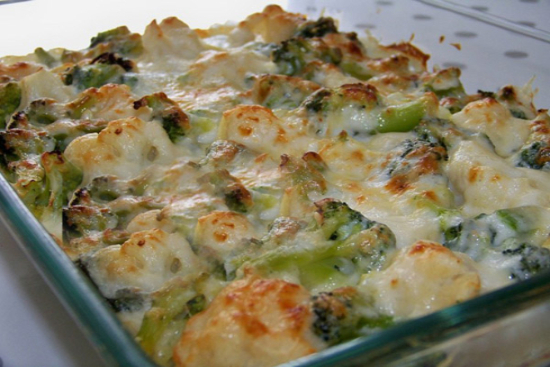
Serves: 4
Preparation time:25 minutes
Cooking time:45 minutes
1 (3-pound) head cauliflower, cut into large florets1 to 1 1/2 pounds broccoli, cut into medium florets
Kosher salt
8 tablespoons plus 2 tablespoons unsalted butter
1/2 cup bleached all-purpose flour
4 cups hot milk
1/2 teaspoon freshly ground black pepper
1/4 teaspoon grated nutmeg
3/4 cup freshly grated Gruyere or Comte cheese, divided
1/2 cup freshly grated Parmesan
1/4 cup fresh bread crumbs
Preheat the oven to 375 degrees F.
Cook the cauliflower florets in a large pot of boiling salted water for 5 to 6 minutes, until tender but still firm. Drain well.
Add the broccoli to the boiling water. Cook until just tender, about 5 minutes. Drain the broccoli in a colander. Rinse under cold running water to cool. Drain well.
Meanwhile, melt the butter in a medium saucepan over low heat. Add the flour, stirring constantly with a whisk for 2 minutes. Pour the hot milk into the butter-flour mixture and stir until it comes to a boil. Boil, whisking constantly, for 1 minute, or until thickened. Off the heat, add 1/2 teaspoon of salt, the pepper, nutmeg, 1/2 cup of the Gruyere, and the Parmesan.
Pour 1/3 of the sauce on the bottom of an 8 by 11 by 2-inch baking dish. Place the drained cauliflower and broccoli on top and then spread the rest of the sauce evenly on top. Combine the bread crumbs with the remaining 1/4 cup of cheese and sprinkle on top. Melt the remaining 2 tablespoons of butter and drizzle over the gratin. Bake for 25 to 30 minutes, until the top is browned. Serve hot.
Cook the cauliflower florets in a large pot of boiling salted water for 5 to 6 minutes, until tender but still firm. Drain well.
Add the broccoli to the boiling water. Cook until just tender, about 5 minutes. Drain the broccoli in a colander. Rinse under cold running water to cool. Drain well.
Meanwhile, melt the butter in a medium saucepan over low heat. Add the flour, stirring constantly with a whisk for 2 minutes. Pour the hot milk into the butter-flour mixture and stir until it comes to a boil. Boil, whisking constantly, for 1 minute, or until thickened. Off the heat, add 1/2 teaspoon of salt, the pepper, nutmeg, 1/2 cup of the Gruyere, and the Parmesan.
Pour 1/3 of the sauce on the bottom of an 8 by 11 by 2-inch baking dish. Place the drained cauliflower and broccoli on top and then spread the rest of the sauce evenly on top. Combine the bread crumbs with the remaining 1/4 cup of cheese and sprinkle on top. Melt the remaining 2 tablespoons of butter and drizzle over the gratin. Bake for 25 to 30 minutes, until the top is browned. Serve hot.
Appetizer Broccoli stems cabbage slaw 
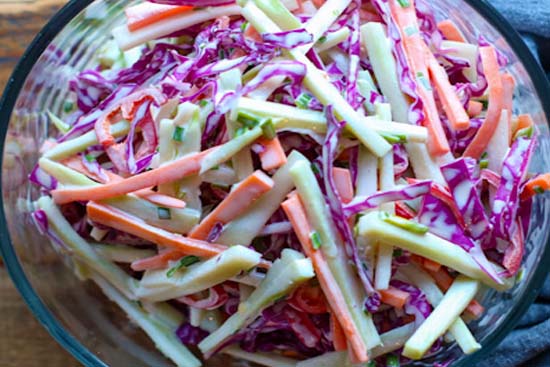
Serves: 6
Preparation time: 25 minutes
1/4 cup raisins 3 or 4 broccoli stems
1/2 small green cabbage
1 small carrot, peeled
1 Granny Smith green apple
COLESLAW DRESSING
Mix well and refrigerate until ready to use.
Soak raisins into a cup of hot water to soften. Peel the broccoli stems, discarding the tough ends.
Shred with a salad shredder or food processor. Remove and discard tough outer leaves from cabbage.
Shred cabbage fine. Shred carrot with the finest blade. Drain raisins well and add to broccoli, carrot and cabbage shred, mixing well.
Peel and core apple and grate or shred. Add to cabbage-broccoli mixture.
Immediately add Coleslaw Dressing to avoid discoloration of the apple. Toss gently to mix well. Refrigerate for an hour before serving.
COLESLAW DRESSING
Mix well and refrigerate until ready to use.
Shred with a salad shredder or food processor. Remove and discard tough outer leaves from cabbage.
Shred cabbage fine. Shred carrot with the finest blade. Drain raisins well and add to broccoli, carrot and cabbage shred, mixing well.
Peel and core apple and grate or shred. Add to cabbage-broccoli mixture.
Immediately add Coleslaw Dressing to avoid discoloration of the apple. Toss gently to mix well. Refrigerate for an hour before serving.
COLESLAW DRESSING
Mix well and refrigerate until ready to use.
Appetizer Brussels Sprout and radicchio Slaw 
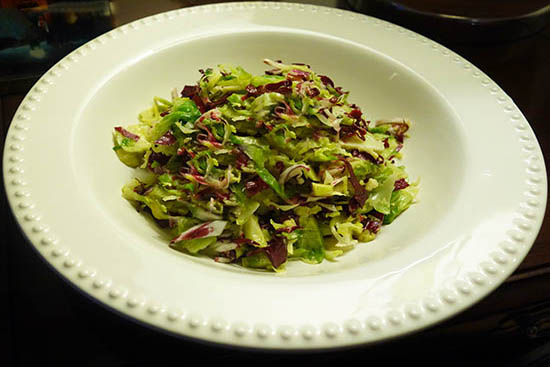
After combining the slaw with the dressing, be sure to let it stand for 15 minutes to slightly wilt the brussels sprouts.
Serves: 6
1 1/2 tsp. plus 1/4 cup olive oil
1/4 tsp. kosher salt, plus more, to taste
1 tsp. sugar
Pinch of cayenne pepper
2 lb. brussels sprouts, trimmed and fibrous stems removed
1 small head radicchio, quartered and cored
2 Tbs. cider vinegar
1 Tbs. fresh lemon juice
2 Tbs. whole-grain mustard
2 Tbs. maple syrup
1/4 cup olive oil
Freshly ground black pepper, to taste
Serves: 6
Preparation time: 20 minutes
Cooking time:10 minutes
1/2 cup pecan halves1 1/2 tsp. plus 1/4 cup olive oil
1/4 tsp. kosher salt, plus more, to taste
1 tsp. sugar
Pinch of cayenne pepper
2 lb. brussels sprouts, trimmed and fibrous stems removed
1 small head radicchio, quartered and cored
2 Tbs. cider vinegar
1 Tbs. fresh lemon juice
2 Tbs. whole-grain mustard
2 Tbs. maple syrup
1/4 cup olive oil
Freshly ground black pepper, to taste
Preheat an oven to 350°F.
In a small bowl, combine the pecans, the 1 1/2 tsp. olive oil, the 1/4 tsp. salt, the sugar and cayenne and stir to coat evenly. Transfer to a baking sheet and toast in the oven until browned, 10 to 12 minutes. Let cool.
Bring large pot of water to boil. Add 2 teaspoons salt. Add brussels sprouts. Cook until crisp-tender about 5 minutes. Drain; rinse with cold water.
Using a food processor fitted with 1/8- to 1/4-inch slicing disk, slice brussels sprouts and radicchio. Transfer to a large bowl and stir to combine.
In a small bowl, whisk together the vinegar, lemon juice, mustard and maple syrup. Slowly whisk in the 1/4 cup olive oil and season with salt and black pepper.
Add half of the dressing to the brussels sprout-radicchio mixture and toss well to combine, adding more dressing as needed. Let stand for 15 minutes to slightly wilt the brussels sprouts. Top with the pecans and serve immediately.
In a small bowl, combine the pecans, the 1 1/2 tsp. olive oil, the 1/4 tsp. salt, the sugar and cayenne and stir to coat evenly. Transfer to a baking sheet and toast in the oven until browned, 10 to 12 minutes. Let cool.
Bring large pot of water to boil. Add 2 teaspoons salt. Add brussels sprouts. Cook until crisp-tender about 5 minutes. Drain; rinse with cold water.
Using a food processor fitted with 1/8- to 1/4-inch slicing disk, slice brussels sprouts and radicchio. Transfer to a large bowl and stir to combine.
In a small bowl, whisk together the vinegar, lemon juice, mustard and maple syrup. Slowly whisk in the 1/4 cup olive oil and season with salt and black pepper.
Add half of the dressing to the brussels sprout-radicchio mixture and toss well to combine, adding more dressing as needed. Let stand for 15 minutes to slightly wilt the brussels sprouts. Top with the pecans and serve immediately.
Appetizer Chicken liver mousse 
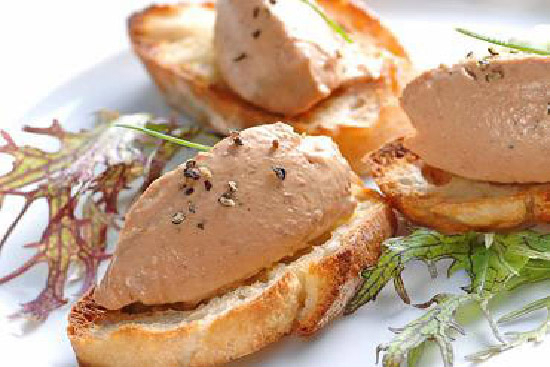
Serves: 10
Preparation time: 30 minutes
Cooking time:15 minutes
12 ounces chicken livers 2 ounces butter
1 cup chopped onion
1 clove minced garlic
1 cup milk
1 ounce dry sherry wine
1/8 teaspoon curry powder
1/2 teaspoon thyme
2 bay leaves
3/4 cup strong aspic
1/4 teaspoon hot pepper sauce
1 teaspoon salt
1/2 cup heavy cream .
Remove connective tissue from the liver. Melt butter in a sauté pan, add onions and garlic and sauté until soft and translucent.
Add all other ingredients except cream. Cook covered for 10 minutes, stirring occasionally. Remove from heat and cool for 5 minutes. Whip cream to medium stiffness. Remove bay leaves from liver mixture. Puree the liver mixture in a food processor until smooth.
Pour into a large bowl and fold in the whipped cream.
Immediately pour into molds and chill.
Dip molds in hot water and unmold chicken liver mousse. Serve as hors d'oeuvre or appetizers
Add all other ingredients except cream. Cook covered for 10 minutes, stirring occasionally. Remove from heat and cool for 5 minutes. Whip cream to medium stiffness. Remove bay leaves from liver mixture. Puree the liver mixture in a food processor until smooth.
Pour into a large bowl and fold in the whipped cream.
Immediately pour into molds and chill.
Dip molds in hot water and unmold chicken liver mousse. Serve as hors d'oeuvre or appetizers
Appetizer Creamy cauliflower purée 
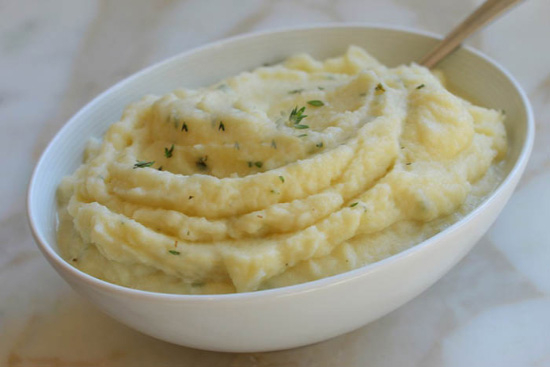
Serves: 4
Preparation time: 10 minutes
Cooking time:15 minutes
1 medium head cauliflower, cut up into florets4 cloves crushed garlic
1/3 cup 1% buttermilk or low fat sour cream
salt and pepper to taste
1 tbsp butter
Steam or boil cauliflower and garlic until soft. Drain, add buttermilk, light butter, salt, pepper and purée with a hand blender or regular blender.
Appetizer German spaetzle 
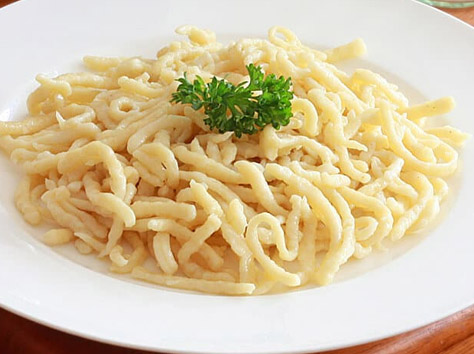
From the Swabia region of Southern Germany comes the traditional German Spaetzle.
Serves: 6
1 1/2 teaspoons salt
1/8 teaspoon freshly ground nutmeg , optional
4 large eggs
1/2 cup milk or water + more as needed (milk produces a richer Spaetzle)
butter for serving
Serves: 6
Preparation time:25 minutes
Cooking time:10 minutes
2 cups all-purpose flour or whole wheat flour 1 1/2 teaspoons salt
1/8 teaspoon freshly ground nutmeg , optional
4 large eggs
1/2 cup milk or water + more as needed (milk produces a richer Spaetzle)
butter for serving
Combine the flour and salt in the bowl of a stand mixer. whisk the eggs into a small bowl. Make a well in the center of the flour mixture and pour the eggs in it. Add the milk (start with using slightly less and add more as needed). Attach a dough hook to the stand mixer and "knead" the dough for 16-20 minutes, or until bubbles appear. A thick batter yields results.
Bring 2 quarts of lightly salted water to a boil, then reduce to a simmer.
Using a Spätzle maker of your choice (such as the Spätzle press), press the noodles into the simmering water and cook for about 2-3 minutes, or until the noodles float to the top. Use a slotted spoon to transfer the noodles to a colander, and then transfer the noodles in a large bowl of ice water. Drain the noodles again, toss with some melted butter and serve warm.
Make Ahead: The Spaetzle can be stored in the fridge for 2 to 3 days and then reheated. Melt some butter in a large skillet and toss the Spätzle in it to heat through.
Bring 2 quarts of lightly salted water to a boil, then reduce to a simmer.
Using a Spätzle maker of your choice (such as the Spätzle press), press the noodles into the simmering water and cook for about 2-3 minutes, or until the noodles float to the top. Use a slotted spoon to transfer the noodles to a colander, and then transfer the noodles in a large bowl of ice water. Drain the noodles again, toss with some melted butter and serve warm.
Make Ahead: The Spaetzle can be stored in the fridge for 2 to 3 days and then reheated. Melt some butter in a large skillet and toss the Spätzle in it to heat through.
Appetizer Ham and cheese toast 
Serves: 6
Preparation time: 20 minutes
Cooking time:10 minutes
2 tablespoons butter 2 tablespoons flour
1 cup milk to taste salt, pepper
1 tablespoon dry white wine
1/8 teaspoon cayenne pepper
1/8 teaspoon nutmeg
1 teaspoon minced garlic
1 egg yolk
2 cups grated Swiss cheese
6 slices crisp unbuttered toasts, ends trimmed
6 thin slices cooked ham
Preheat broiler to high.
In a heavy saucepan, melt the butter and add flour, stirring with a whisk. Add milk. Whisk until sauce thickens. Season with salt with salt, pepper, wine, cayenne, nutmeg and garlic. Add egg yolk and bring to the boil, stirring. Remove from heat.
Stir in cheese until melted.
Arrange slices of toast in one layer in a baking pan. Top each slice with ham. Spread cheese mixture evenly over ham.
Broil until bubbly and browned on top. Serve hot
In a heavy saucepan, melt the butter and add flour, stirring with a whisk. Add milk. Whisk until sauce thickens. Season with salt with salt, pepper, wine, cayenne, nutmeg and garlic. Add egg yolk and bring to the boil, stirring. Remove from heat.
Stir in cheese until melted.
Arrange slices of toast in one layer in a baking pan. Top each slice with ham. Spread cheese mixture evenly over ham.
Broil until bubbly and browned on top. Serve hot
Appetizer Herb roasted potatoes 
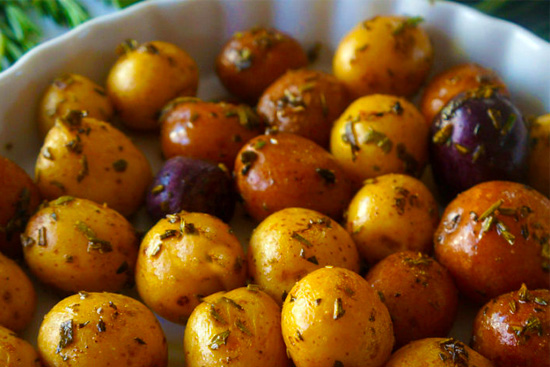
Serves: 4
Preparation time: 15 minutes
Cooking time:40 minutes
3 tablespoons Dijon mustard 2 tablespoons olive oil
1 clove garlic, chopped
1/2 teaspoon Italian seasoning
6 medium red skin potatoes, cut into chunks
Preheat oven to 425 degrees. Combine all ingredients, except potatoes. Place potatoes in lightly greased 13x9x2-inch baking pan, toss with mustard mixture.
Bake 35 to 40 minutes or until potatoes are fork tender, stirring occasionally.
Bake 35 to 40 minutes or until potatoes are fork tender, stirring occasionally.
Appetizer Leeks au gratin 
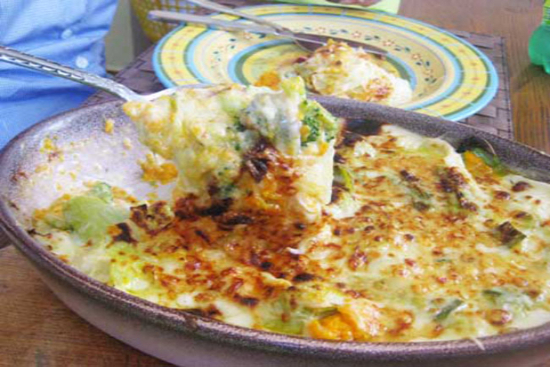
Serves: 8
Preparation time: 15 minutes
Cooking time:45 minutes
16 small leeks, white and light green parts only washed well 1 teaspoon salt
ground pepper to taste
2 teaspoons unsalted butter, cut into pieces
1 cup heavy cream
Preheat oven to 350 degrees.
Bring a large pot of water to a boil. Add the leeks and blanch until tender, about 15 minutes. Drain well.
Place leeks in a shallow baking dish large enough to hold them in a single layer. Season with salt and pepper and dot with butter.
Pour the cream over top. Bake for 25 minutes (can be made ahead up to this point and reheated.) Just before serving, preheat broiler and brown the leeks under the broiler. Serve.
Bring a large pot of water to a boil. Add the leeks and blanch until tender, about 15 minutes. Drain well.
Place leeks in a shallow baking dish large enough to hold them in a single layer. Season with salt and pepper and dot with butter.
Pour the cream over top. Bake for 25 minutes (can be made ahead up to this point and reheated.) Just before serving, preheat broiler and brown the leeks under the broiler. Serve.
Appetizer Marinated onions 
Serves: 4
Preparation time: 10 minutes
Cooking time:8 minutes
For Marinade: 3/4 cup dry white wine
3/4 cup white vinegar
4 cups water
3 tablespoons oil
2 cloves garlic
4 small stems of parsley
1 teaspoon sugar
1 teaspoon salt
1/8 teaspoon cayenne pepper
1 teaspoon chopped basil
1 teaspoon Dijon mustard
1 pound pearl onions, peeled
1 teaspoon chopped parsley
Combine all ingredients except the pearl onions and chopped parsley. Bring marinade ingredients to a boil.
Remove from heat and pour over onions. Cool. Refrigerate for 48 hours.
When ready to serve, sprinkle with chopped parsley.
Remove from heat and pour over onions. Cool. Refrigerate for 48 hours.
When ready to serve, sprinkle with chopped parsley.
Appetizer Mixed cabbage salad 
Serves: 8
Preparation time: 20 minutes
3 cups shredded Chinese cabbage 3 cups shredded red cabbage
1 small chopped white onion
2 medium grated carrots
1 small grated white radish
1/2 cup alfalfa sprouts
dressing:
1/2 cup canola oil
1/2 cup mayonnaise
1 clove minced garlic
1 teaspoon soy sauce
2 tablespoons red wine vinegar
In two separate salad bowls, mix 1/2 of the onion with Chinese cabbage and the other 1/2 with red cabbage.
For dressing:
In a mixing bowl, whisk the oil, mayonnaise, garlic, soy sauce and vinegar.
Pour some of the dressing over each cabbage. Toss and arrange separately on serving platter.
Top with remaining vegetables. Serve with dressing.
For dressing:
In a mixing bowl, whisk the oil, mayonnaise, garlic, soy sauce and vinegar.
Pour some of the dressing over each cabbage. Toss and arrange separately on serving platter.
Top with remaining vegetables. Serve with dressing.
Appetizer Onion braid 
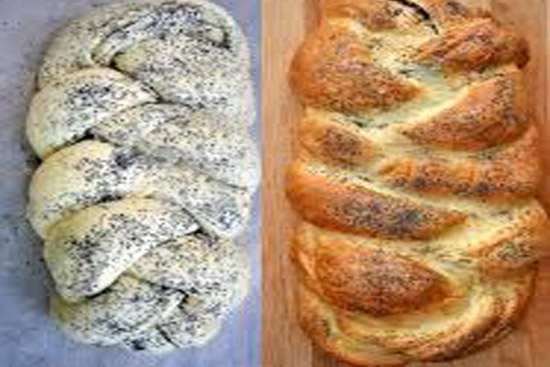
Serves: 8
Preparation time: 50 minutes
Cooking time:35 minutes
For dough: 4 cups flour
1/4 cup sugar
3/4 teaspoon salt
1 teaspoon instant dry yeast
1/2 cup milk
1/2 cup water
1/4 cup butter
1 egg
For filling:
1 cup finely chopped onion
1/4 cup butter
1 teaspoon grated parmesan cheese
1 teaspoon sesame seeds
1 teaspoon garlic salt
1 teaspoon paprika
Reserve 1 cup of flour. Mix remaining flour, sugar, salt, and yeast in a large bowl. Heat milk, water and butter until very warm (125 F/50 C).
Stir warm liquid into dry ingredients. Beat in egg. Mix in enough of the reserved flour to make a soft dough that does not stick to bowl. Turn out onto floured surface; knead until smooth and elastic, about 5 minutes. Cover; let rest 10 minutes.
Meanwhile, sauté onion in butter. Remove from heat and stir in remaining filling ingredients; set aside.
Roll dough into 18-by-12-inch rectangle. Cut evenly into three lengthwise strips 18 x 4-inch.
Evenly spread filling along center of strips. Fold each strip lengthwise and pinch edges together along 18-inch side to enclose filling. Braid strips together. Pinch ends to seal and tuck ends under loaf. Grease a baking sheet.
Place braid on sheet. Cover. Let rise in warm draft-free place until doubled in size, about 40 minutes.
Preheat oven to 350 degrees. Brush top with beaten egg white and sprinkle with more sesame seed, if desired. Bake 30 to 35 minutes or until done. Remove to wire rack to cool.
Stir warm liquid into dry ingredients. Beat in egg. Mix in enough of the reserved flour to make a soft dough that does not stick to bowl. Turn out onto floured surface; knead until smooth and elastic, about 5 minutes. Cover; let rest 10 minutes.
Meanwhile, sauté onion in butter. Remove from heat and stir in remaining filling ingredients; set aside.
Roll dough into 18-by-12-inch rectangle. Cut evenly into three lengthwise strips 18 x 4-inch.
Evenly spread filling along center of strips. Fold each strip lengthwise and pinch edges together along 18-inch side to enclose filling. Braid strips together. Pinch ends to seal and tuck ends under loaf. Grease a baking sheet.
Place braid on sheet. Cover. Let rise in warm draft-free place until doubled in size, about 40 minutes.
Preheat oven to 350 degrees. Brush top with beaten egg white and sprinkle with more sesame seed, if desired. Bake 30 to 35 minutes or until done. Remove to wire rack to cool.
Appetizer Potato cake 
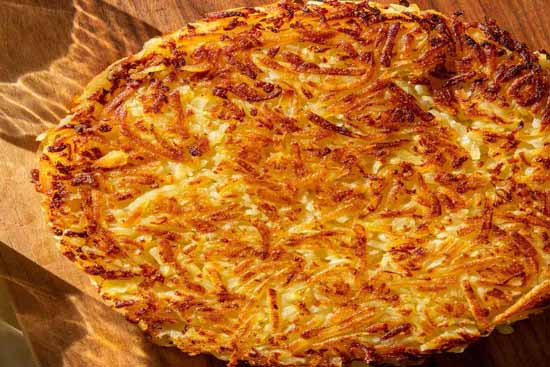
Serves: 10
Preparation time: 20 minutes
Cooking time:1 hour
5 pounds potatoes 5 slices bacon
4 ounces butter
2 ounces chopped onion
to taste salt
Boil the potatoes in their skin in salted boiling water.
Peel potatoes when cool then grate coarsely.
Cut bacon slices across into small pieces. Fry until crisp. Saute onions with butter.
Add the potatoes and bacon bits. Season with salt. Mix well while turning the potatoes. Brown both sides of the potato cake and serve hot.
Peel potatoes when cool then grate coarsely.
Cut bacon slices across into small pieces. Fry until crisp. Saute onions with butter.
Add the potatoes and bacon bits. Season with salt. Mix well while turning the potatoes. Brown both sides of the potato cake and serve hot.
Appetizer Roasted brussel sprouts with feta 

Serves: 3
Preparation time:15 minutes
Cooking time:35 minutes
1 lb. fresh brussel sprouts, washed and halved2–3 cloves garlic, minced or grated
1–2 tablespoons extra virgin olive oil, more as needed
Salt and pepper to taste
1/4 cup walnuts, roughly chopped
1 cup feta cheese
1/2 cup dried cranberries
Preheat oven to 350 degrees F and line a baking sheet with parchment paper.
Toss walnuts with 1-2 teaspoons olive oil and salt, if desired.
Bake for 7-10 minutes or until just golden brown. Set aside.
Increase oven temperature to 425 degrees F and line baking sheet with a new piece of parchment paper.
Toss brussel sprouts well with 2 tablespoons olive oil, garlic, salt and pepper.
Place on baking sheet in a single layer and bake for 25-30 minutes (or until just browned and crispy on the outside), tossing halfway through.
Remove from oven, add feta cheese and then place back in the oven keeping a careful eye on them so they don’t burn. Cook until feta gets warm and start to melt (2-3 minutes).
Toss with toasted walnuts and dried cranberries, then serve.
Toss walnuts with 1-2 teaspoons olive oil and salt, if desired.
Bake for 7-10 minutes or until just golden brown. Set aside.
Increase oven temperature to 425 degrees F and line baking sheet with a new piece of parchment paper.
Toss brussel sprouts well with 2 tablespoons olive oil, garlic, salt and pepper.
Place on baking sheet in a single layer and bake for 25-30 minutes (or until just browned and crispy on the outside), tossing halfway through.
Remove from oven, add feta cheese and then place back in the oven keeping a careful eye on them so they don’t burn. Cook until feta gets warm and start to melt (2-3 minutes).
Toss with toasted walnuts and dried cranberries, then serve.
Appetizer Warm brussels sprout salad 
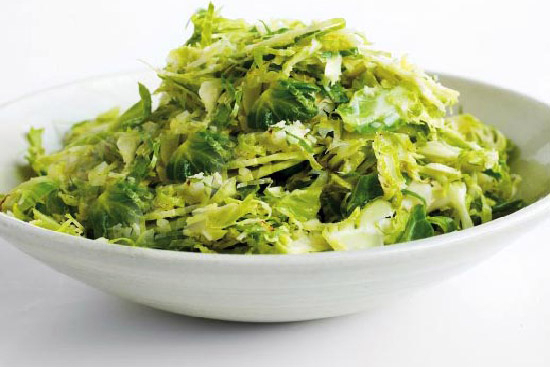
This simple side of sauteed shredded brussels sprouts goes well with pork chops, sea scallops, or roasted chicken.
To shred brussels sprouts, halve them, then slice crosswise, or use the slicer blade in a food processor.
Serves: 4
3/4 pound brussels sprouts, trimmed and shredded
coarse salt and ground pepper
3 tablespoons fresh lemon juice
1/4 cup grated pecorino cheese (1/2 ounce)
Serves: 4
Preparation time: 15 minutes
Cooking time:8 minutes
2 tablespoons extra-virgin olive oil3/4 pound brussels sprouts, trimmed and shredded
coarse salt and ground pepper
3 tablespoons fresh lemon juice
1/4 cup grated pecorino cheese (1/2 ounce)
In a large skillet, heat 1 tablespoon oil over medium-high. Add brussels sprouts. Season with salt and pepper and cook, tossing often, until bright green and slightly wilted, about 3 minutes. Add lemon juice and transfer to a large bowl. Add cheese and 1 tablespoon oil; toss well to combine and season with salt and pepper.
Main Braised endives in beer 
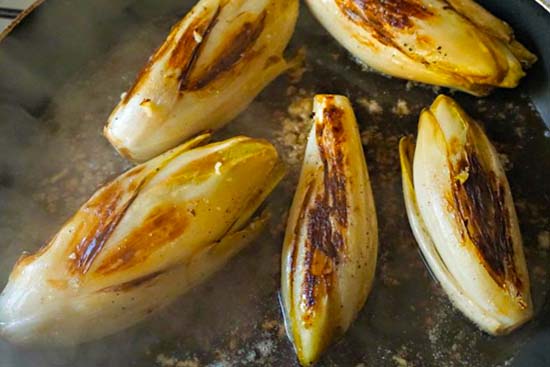
Serves: 6
Preparation time: 30 minutes
Cooking time:40 minutes
12 medium endives 1/2 cup butter
1 cup beer
1 tablespoon sugar
2 chicken bouillon cubes
ground pepper to taste
1/4 cup dry bread crumbs
1/4 cup shredded gruyere
1/4 cup melted butter
Remove any bruised outer leaves from the endives, leaving the heads intact. Trim the bases and tips and wipe with a damp cloth.
Melt butter in a large skillet.
Arrange endives in the skillet in a single layer. Cook over medium heat to brown the endives on all sides.
Add beer, sugar, and bouillon cubes.
Cover and simmer 20 minutes or until tender. Preheat oven to 400 degrees.
Transfer endives to a gratin dish. Reduce cooking liquid to 3 tablespoons. Sprinkle endives with bread crumbs and shredded cheese.
Pour any remaining liquid from the endives in the skillet over the endives. Pour melted butter over the endives.
Bake endives until golden brown. Serve immediately.
Main Grilled pork chops with red onion marmalade 
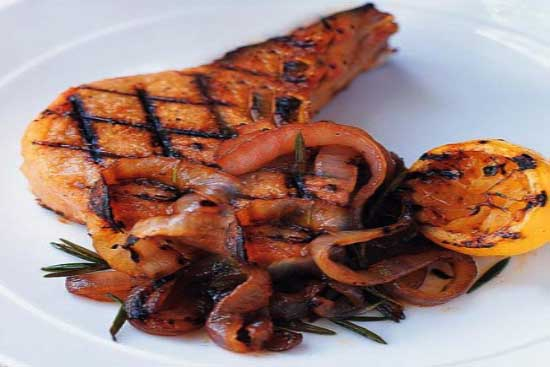
Serves: 6
Preparation time: 15 minutes
Cooking time:40 minutes
6 center cut pork chops 1 cup apple cider
1 teaspoon salt
3 cloves minced garlic
1 sprig chopped thyme
1 sprig chopped rosemary
RED ONION MARMALADE:
(marmalade may be made up to 2 days ahead).
3 tablespoons extra virgin olive oil
10 cups red onions, thinly sliced
1 tablespoon brown sugar
to taste salt and white pepper
3/4 cup red wine vinegar
1 1/4 cups red wine
combine apple cider, kosher salt, garlic, thyme and rosemary in a glass bowl. Add pork chops and mix well with marinade. Marinate for 30 minutes to one hour, refrigerated.
Remove chops from the marinade and pat dry.
Broil or cook pork chops on an open grill for approximately 10 minutes, turning as needed. Serve with red onion marmalade.
RED ONION MARMALADE:
(marmalade may be made up to 2 days ahead).
3 tablespoons extra virgin olive oil
10 cups red onions, thinly sliced
1 tablespoon brown sugar
to taste salt and white pepper
3/4 cup red wine vinegar
1 1/4 cups red wine
Heat olive oil in a large heavy bottomed saucepan and add the onions. Cook over medium heat until they begin to soften, about 10 minutes, then add the brown sugar and stir to coat. Season with salt and pepper.
Continue cooking over medium heat, stirring frequently, or bake in a 350 degree oven until the onions are golden soft and brown.
Add the vinegar and cook until it has completely evaporated, then add the red wine stirring the onions frequently to prevent sticking and burning. When the red wine has evaporated, taste and adjust the seasoning. Remove from heat and keep warm
Remove chops from the marinade and pat dry.
Broil or cook pork chops on an open grill for approximately 10 minutes, turning as needed. Serve with red onion marmalade.
RED ONION MARMALADE:
(marmalade may be made up to 2 days ahead).
3 tablespoons extra virgin olive oil
10 cups red onions, thinly sliced
1 tablespoon brown sugar
to taste salt and white pepper
3/4 cup red wine vinegar
1 1/4 cups red wine
Heat olive oil in a large heavy bottomed saucepan and add the onions. Cook over medium heat until they begin to soften, about 10 minutes, then add the brown sugar and stir to coat. Season with salt and pepper.
Continue cooking over medium heat, stirring frequently, or bake in a 350 degree oven until the onions are golden soft and brown.
Add the vinegar and cook until it has completely evaporated, then add the red wine stirring the onions frequently to prevent sticking and burning. When the red wine has evaporated, taste and adjust the seasoning. Remove from heat and keep warm
Main Jaeger schnitzel 
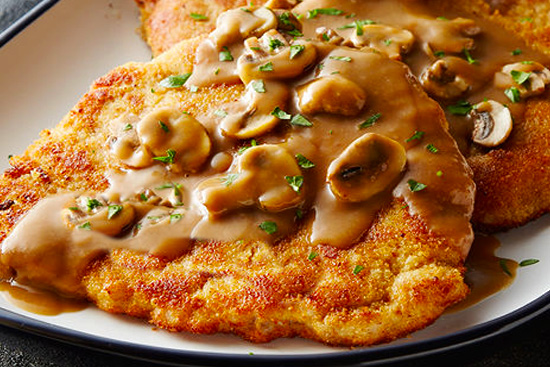
Jaeger Schnitzel or Jägerschnitzel means hunter’s schnitzel. It’s a schnitzel topped with a mushroom sauce. Jaeger Schnitzel was originally made with venison or wild boar that was pounded thin. It’s generally made with pork. In Europe Wiener schnitzel, sometimes spelled Wienerschnitzel, as in Switzerland, is a type of schnitzel made of a thin, breaded, pan-fried veal cutlet.
You can make your own breadcrumbs, add fresh herbs and serve with fried potatoes or rice.
Serves: 4
1/2 cup all-purpose flour
1 teaspoon salt
1 large egg, beaten
3/4 cup plain bread crumbs
5 ounces button mushrooms, sliced
3 tablespoons butter
3 tablespoons all-purpose flour
1 can (14.5 oz) beef broth
Salt and freshly ground black pepper
1. Place the pork chops between two sheets of plastic wrap and pound them with the flat side of a meat tenderizer until they're 1/4 inch thick. Sprinkle lightly with salt and freshly ground black pepper. Set aside.
2
If using fresh mushrooms, heat a tablespoon of olive oil in a small skillet over medium-high heat and add the mushrooms. Cook until the mushrooms have released their juices and the liquid is mostly evaporated. Transfer the mushrooms to a plate and set aside.
3
In the same skillet, melt the butter, add the flour, and whisk until the flour is dissolved. Continue to whisk constantly until the mixture is a rich, deep golden brown, about 3-4 minutes.
4
Slowly add the beef broth, whisking constantly, until combined. Return the mushrooms to the skillet. If using canned mushrooms, you will add them at this point. Bring the gravy to a simmer, reduce to low, and simmer uncovered for about 15 minutes or until the gravy is thickened. Season with salt and pepper.
5
While the gravy is simmering, dip the chops in the flour, the egg, and the breadcrumbs. Do not press the breadcrumbs into the meat. Coat gently but thoroughly, and shake off the excess crumbs.
6
Fry the Schnitzel for about 2-3 minutes on each side. When they are a deep golden brown, transfer them to a plate. Serve immediately with the mushroom gravy and your choice of sides.
Serves: 4
Preparation time:15 minutes
Cooking time:15 minutes
4 boneless pork chops1/2 cup all-purpose flour
1 teaspoon salt
1 large egg, beaten
3/4 cup plain bread crumbs
5 ounces button mushrooms, sliced
3 tablespoons butter
3 tablespoons all-purpose flour
1 can (14.5 oz) beef broth
Salt and freshly ground black pepper
1. Place the pork chops between two sheets of plastic wrap and pound them with the flat side of a meat tenderizer until they're 1/4 inch thick. Sprinkle lightly with salt and freshly ground black pepper. Set aside.
2
If using fresh mushrooms, heat a tablespoon of olive oil in a small skillet over medium-high heat and add the mushrooms. Cook until the mushrooms have released their juices and the liquid is mostly evaporated. Transfer the mushrooms to a plate and set aside.
3
In the same skillet, melt the butter, add the flour, and whisk until the flour is dissolved. Continue to whisk constantly until the mixture is a rich, deep golden brown, about 3-4 minutes.
4
Slowly add the beef broth, whisking constantly, until combined. Return the mushrooms to the skillet. If using canned mushrooms, you will add them at this point. Bring the gravy to a simmer, reduce to low, and simmer uncovered for about 15 minutes or until the gravy is thickened. Season with salt and pepper.
5
While the gravy is simmering, dip the chops in the flour, the egg, and the breadcrumbs. Do not press the breadcrumbs into the meat. Coat gently but thoroughly, and shake off the excess crumbs.
6
Fry the Schnitzel for about 2-3 minutes on each side. When they are a deep golden brown, transfer them to a plate. Serve immediately with the mushroom gravy and your choice of sides.
Main Old fashion beef stew 
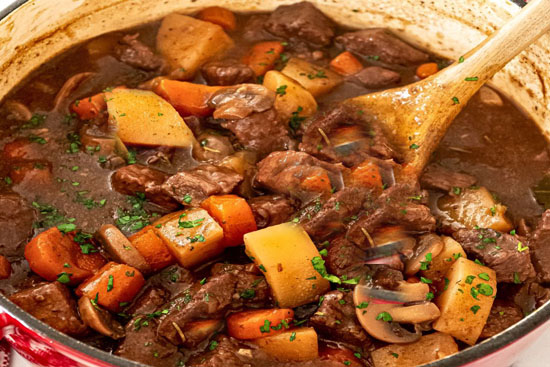
Serves: 6
Preparation time: 30 minutes
Cooking time:2 hours 30 minutes
3 tablespoons butter 3 tablespoons canola oil
2 pounds boneless beef chuck, cut into 1-inch cubes
2 chopped shallots
2 tablespoons flour
1 quart beef stock
1 1/2 cups dry red wine
1 tablespoon tomato paste
2 cloves minced garlic
1 teaspoon dried savory
1/2 teaspoon dried thyme
4 medium potatoes, peeled and cubed
4 sliced carrots
20 small white onions, peeled
1/4 cup canola oil
8 ounces fresh mushrooms, cut into quarters
chopped parsley for garnish
Preheat oven to 350 degrees In a heavy casserole, heat butter and oil. Brown beef with shallots.
Add flour, cook to brown, then mix in beef stock and wine. Bring to a boil.
Season with salt, and pepper. Add tomato paste, garlic, savory and thyme.
Cover casserole and bake for 2 hours.
Add carrots and potatoes to stew 1/2 hour before meat is cooked. Blanch white onions in boiling water. Drain.
Heat oil in a frying pan.
Fry onions and mushrooms until brown and tender.
Add to stew when meat is tender. Sprinkle with chopped parsley.
Add flour, cook to brown, then mix in beef stock and wine. Bring to a boil.
Season with salt, and pepper. Add tomato paste, garlic, savory and thyme.
Cover casserole and bake for 2 hours.
Add carrots and potatoes to stew 1/2 hour before meat is cooked. Blanch white onions in boiling water. Drain.
Heat oil in a frying pan.
Fry onions and mushrooms until brown and tender.
Add to stew when meat is tender. Sprinkle with chopped parsley.
Main Potato cake 

Serves: 10
Preparation time: 20 minutes
Cooking time:1 hour
5 pounds potatoes 5 slices bacon
4 ounces butter
2 ounces chopped onion
to taste salt
Boil the potatoes in their skin in salted boiling water.
Peel potatoes when cool then grate coarsely.
Cut bacon slices across into small pieces. Fry until crisp. Saute onions with butter.
Add the potatoes and bacon bits. Season with salt. Mix well while turning the potatoes. Brown both sides of the potato cake and serve hot.
Peel potatoes when cool then grate coarsely.
Cut bacon slices across into small pieces. Fry until crisp. Saute onions with butter.
Add the potatoes and bacon bits. Season with salt. Mix well while turning the potatoes. Brown both sides of the potato cake and serve hot.
Main Puff pastry rochoises 
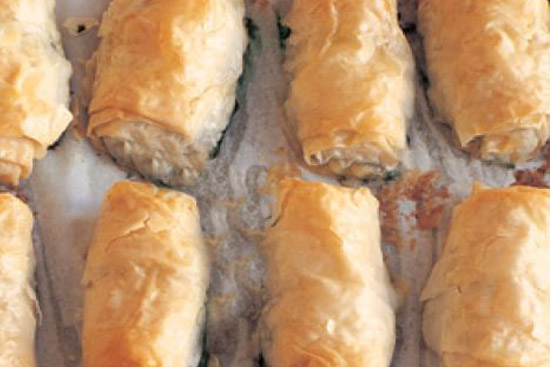
Serves: 8
Preparation time: 30 minutes
Cooking time:10 minutes
2 ounces butter 2 ounces flour
2 cups milk
salt, pepper, nutmeg to taste
5 egg yolks
3 1/2 ounces diced ham
3 1/2 ounces diced cooked sausage
4 1/2 ounces grated Swiss cheese
1 pound puff pastry
1/2 cup flour 1 egg, beaten
1 cup fine bread crumbs
fried parsley for garnish
In a saucepan, make a roux with butter and flour. Add milk. Whisk until sauce thickens. Season with salt, pepper and nutmeg. Add egg yolks. Whisk sauce to boil a few seconds. Cool sauce.
Mix in diced ham and sausage, and grated cheese. Pour into an oiled baking pan so that mixture is 1 inch high. Chill.
Roll cheese mixture into small cylinders. Place on 2 by 4-inch pieces of thinly rolled puff pastry. Seal.
Roll in flour, egg and fine breadcrumbs. Deep fry. Serve with fried parsley.
Mix in diced ham and sausage, and grated cheese. Pour into an oiled baking pan so that mixture is 1 inch high. Chill.
Roll cheese mixture into small cylinders. Place on 2 by 4-inch pieces of thinly rolled puff pastry. Seal.
Roll in flour, egg and fine breadcrumbs. Deep fry. Serve with fried parsley.
Main Roast loin of pork with prunes 
Serves: 6
Preparation time: 30 minutes
Cooking time:1 hour 15 minutes
12 dried pitted prunes 1 2-pound boneless pork loin roast
salt and pepper to taste
1/4 cup olive oil
2 tablespoons chopped fresh rosemary or 1 tablespoon dried
2 tablespoons chopped garlic
1 tablespoon chopped ginger
2 cups sliced onions
1 1/2 cups brown sauce
In a medium bowl, cover prunes with boiling water and let stand for one hour.
Run a knife through the center of the loin of pork to make a pocket for the prunes. Drain prunes; insert throughout the loin. Tie the loin with string to maintain its shape. Season with salt and pepper.
Rub the loin with oil, rosemary, garlic and ginger. Preheat oven to 350 °F. Transfer pork to a roasting pan; Roast until thermometer inserted into center registers 150 degrees, about 55 minutes. Let stand 15 minutes.
Make gravy with pork drippings, adding water and brown sauce mix.
Slice pork; arrange on platter. Drizzle some sauce over. Serve, passing extra sauce separately.
Note: Add some pork bones to the loin while roasting. And use the bones to make the gravy.
Run a knife through the center of the loin of pork to make a pocket for the prunes. Drain prunes; insert throughout the loin. Tie the loin with string to maintain its shape. Season with salt and pepper.
Rub the loin with oil, rosemary, garlic and ginger. Preheat oven to 350 °F. Transfer pork to a roasting pan; Roast until thermometer inserted into center registers 150 degrees, about 55 minutes. Let stand 15 minutes.
Make gravy with pork drippings, adding water and brown sauce mix.
Slice pork; arrange on platter. Drizzle some sauce over. Serve, passing extra sauce separately.
Note: Add some pork bones to the loin while roasting. And use the bones to make the gravy.
Main Seared chicken breast with red onion vinaigrette 
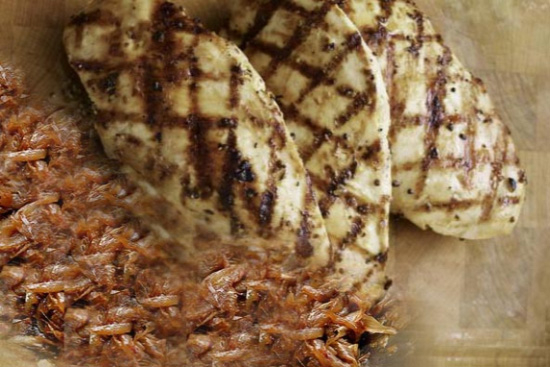
Serves: 6
Preparation time: 20 minutes
Cooking time:40 minutes
1 teaspoon + 1/2 cup olive oil 1 cup finely diced red onion
2 teaspoons minced fresh thyme
to taste salt and freshly ground pepper
2 cups chicken stock
3/4 cup red burgundy wine
1 tablespoon canned tomato puree
2 cloves garlic
1 bouquet garni
1 tablespoon red wine vinegar
3 whole boneless chicken breasts, skin on
1 tablespoon coarsely cracked black pepper
1 teaspoon corn oil
Heat 1 teaspoon olive oil in small sauté pan.
Add the onion. Saute until well browned and caramelized. Stir in thyme, salt and pepper. Set aside.
Combine stock, wine, tomato puree, garlic, and sachet (see note below).
Bring to a boil. Lower heat and simmer 25 minutes or until liquid is reduced to 3/4 cup.
Remove from heat and discard sachet. Pour liquid into a heat proof bowl. Allow to slightly cool. Alternately whisk in 1/2 cup olive oil and vinegar until emulsified.
Stir in caramelized onion. Keep warm in top half of double-boiler over hot water until ready to serve.
Preheat oven to 375 degrees. Split chicken in half and trim off any cartilage or bone.
Generously season with salt and cracked pepper. Heat corn oil in large oven proof saute pan. When hot , add chicken, skin side down. Cook for 5 minutes or until golden brown. Remove from oven and place over low heat. Add the vinaigrette and baste to coat. When well coated and cooked, serve with vinaigrette served over top.
Sachet:
bunch of parsley stems about the size of your little finger, 10 peppercorns, 1 teaspoon dried thyme, and 2 bay leaves tied in cheesecloth bag.
Add the onion. Saute until well browned and caramelized. Stir in thyme, salt and pepper. Set aside.
Combine stock, wine, tomato puree, garlic, and sachet (see note below).
Bring to a boil. Lower heat and simmer 25 minutes or until liquid is reduced to 3/4 cup.
Remove from heat and discard sachet. Pour liquid into a heat proof bowl. Allow to slightly cool. Alternately whisk in 1/2 cup olive oil and vinegar until emulsified.
Stir in caramelized onion. Keep warm in top half of double-boiler over hot water until ready to serve.
Preheat oven to 375 degrees. Split chicken in half and trim off any cartilage or bone.
Generously season with salt and cracked pepper. Heat corn oil in large oven proof saute pan. When hot , add chicken, skin side down. Cook for 5 minutes or until golden brown. Remove from oven and place over low heat. Add the vinaigrette and baste to coat. When well coated and cooked, serve with vinaigrette served over top.
Sachet:
bunch of parsley stems about the size of your little finger, 10 peppercorns, 1 teaspoon dried thyme, and 2 bay leaves tied in cheesecloth bag.
Main Split pea soup 
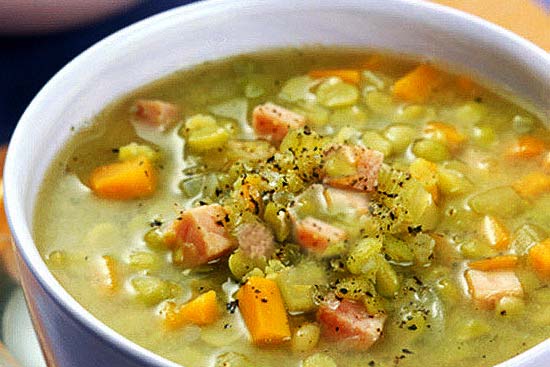
Serves: 6
Preparation time:30 minutes
Cooking time:30 minutes
6 Tbsp butter or olive oil, divided2 cups chopped leeks, white and green parts
2 cups (½-inch) diced carrots
1½ cups chopped yellow onion
1 Tbsp minced garlic
1 lb dried green split peas
8 cups chicken or vegetable stock
1 smoked ham hock
2 tsp kosher salt
1 tsp freshly ground black pepper
8 fresh thyme sprigs, tied with kitchen twine
2 large bay leaves
12 oz smoked sausage, halved lengthwise and sliced diagonally into ¼-inch-thick pieces
Minced fresh parsley, for garnish
Heat ¼ cup of the butter oroil in a large ot or Dutch oven over medium-high. Add leeks, carrots and onion; cook 8 minutes, stirring occasionally. Stir in garlic; cook 1 minute. Stir in peas to coat; cook 1 minute. Add stock, 2 cups water, ham hock, salt, pepper, thyme and bay leaves. Bring to a boil, reduce heat and simmer, partially covered, 1¼ hours, stirring occasionally, or until peas are very tender and falling apart. (Stir bottom of the pot to be sure soup doesn’t stick.)
Discard thyme, bay leaves and ham hock. Transfer 2 cups soup to a food processor fitted with a steel blade; puree. Return puree to pot. Stir in more stock or water if soup is too thick.
Heat remaining 2 Tbsp butter or oil in a medium saute pan over medium. Add sausage; cook 5–6 minutes or until browned, tossing occasionally. Serve soup garnished with sausage and parsley.
Discard thyme, bay leaves and ham hock. Transfer 2 cups soup to a food processor fitted with a steel blade; puree. Return puree to pot. Stir in more stock or water if soup is too thick.
Heat remaining 2 Tbsp butter or oil in a medium saute pan over medium. Add sausage; cook 5–6 minutes or until browned, tossing occasionally. Serve soup garnished with sausage and parsley.
Main Tarragon roasted chicken 
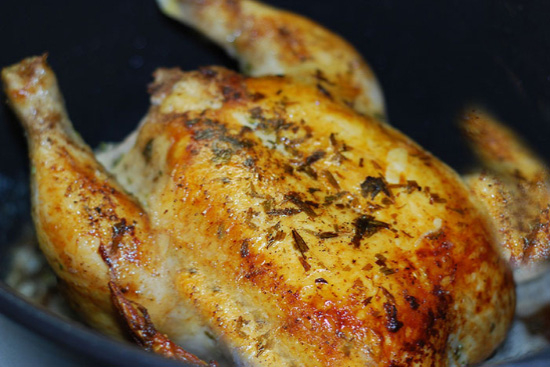
Serves: 4
Preparation time: 25 minutes
Cooking time:1 hour 30 minutes
1 roasting chicken (3-4 pounds) salt and freshly ground pepper
5 sprigs of fresh tarragon
1 small onion, halved
1 tablespoon olive oil
2 tablespoons water
1 medium carrot, chopped
1 medium onion, chopped
1 garlic clove
10 sprigs fresh parsley
2 sprigs fresh thyme
1 bay leaf
1/2 cup dry white wine
1/2 chicken stock
1 teaspoon chopped fresh tarragon
Preheat oven to 450 degrees.
Wash chicken, inside and out, with cold running water. Pat dry. Season inside and out with salt and pepper.
Place the tarragon sprigs and halved onion in the cavity. Tuck wings tips under.
Tie the legs together with butcher's twine. Heat the oil in a medium nonstick roasting pan.
Place the chicken, on its side, in the pan. Roast, basting every 10 minutes for 20 minutes.
Turn the chicken on its other side, and add the water. Reduce the oven heat to 400 degrees.
Roast, basting every ten minutes, for 20 minutes. Turn the chicken on its back.
Add carrots, onions, garlic, parsley , thyme and bay leaf. Continue roasting for 10 more minutes, or until an instant-read thermometer inserted in the center of the breast registers 170 degrees.
Remove the chicken form the oven, and lift onto a platter. Cover loosely with foil.
Strain the vegetables and fat in a bowl. Discard fat and herbs. Return vegetables to the pan.
Add wine and stock to roasting pan. Heat to deglaze and simmer 5 minutes.
Strain into a saucepan and stir in the chopped tarragon. Season with salt and pepper.
Cut the breasts and legs from the chicken. Slice each breast across in two pieces. Separate the drumsticks form the thighs. Serve with the hot sauce.
Serve with rice, potatoes or noodles
Wash chicken, inside and out, with cold running water. Pat dry. Season inside and out with salt and pepper.
Place the tarragon sprigs and halved onion in the cavity. Tuck wings tips under.
Tie the legs together with butcher's twine. Heat the oil in a medium nonstick roasting pan.
Place the chicken, on its side, in the pan. Roast, basting every 10 minutes for 20 minutes.
Turn the chicken on its other side, and add the water. Reduce the oven heat to 400 degrees.
Roast, basting every ten minutes, for 20 minutes. Turn the chicken on its back.
Add carrots, onions, garlic, parsley , thyme and bay leaf. Continue roasting for 10 more minutes, or until an instant-read thermometer inserted in the center of the breast registers 170 degrees.
Remove the chicken form the oven, and lift onto a platter. Cover loosely with foil.
Strain the vegetables and fat in a bowl. Discard fat and herbs. Return vegetables to the pan.
Add wine and stock to roasting pan. Heat to deglaze and simmer 5 minutes.
Strain into a saucepan and stir in the chopped tarragon. Season with salt and pepper.
Cut the breasts and legs from the chicken. Slice each breast across in two pieces. Separate the drumsticks form the thighs. Serve with the hot sauce.
Serve with rice, potatoes or noodles
Main Winter squash soup 
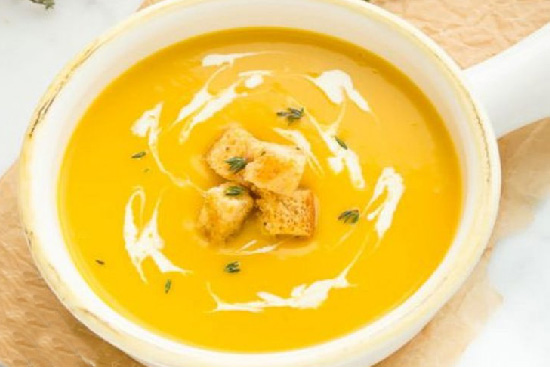
Serves: 8
Preparation time: 20 minutes
Cooking time:30 minutes
1/4 cup ( 1/2 stick) butter 1 large onion, finely chopped
4 large garlic cloves, chopped
6 cups chicken stock or broth
4 cups 1-inch pieces peeled butternut squash (about 1 1/2 pounds)
4 cups 1-inch pieces peeled acorn squash (about 1 1/2 pounds)
1 1/4 teaspoons minced fresh thyme
1 1/4 teaspoons minced fresh sage
1/4 cup whipping cream
2 teaspoons sugar
Croutons
2 tablespoons (1/4 stick) butter
24 1/4-inch-thick baguette bread slices
1 cup grated Gruyère cheese
1 teaspoon minced fresh thyme
1 teaspoon minced fresh sage
For soup:
Melt butter in large pot over medium heat. Add onion and garlic and sauté until tender, about 10 minutes. Add broth, all squash and herbs; bring to boil. Reduce heat, cover and simmer until squash is very tender, about 20 minutes. Puree soup in blender. Return soup to same pot. Stir in cream and sugar; bring to simmer. Season with salt and pepper. (Can be made 1 day ahead. Chill. Rewarm over medium heat before serving.)
For croutons:
Preheat broiler. Butter 1 side of each bread slice. Arrange bread, buttered side up, on baking sheet. Broil until golden, about 1 minute. Turn over.
Sprinkle cheese, then thyme and sage over. Sprinkle with salt and pepper. Broil until cheese melts, about 1 minute.
Ladle soup into bowls. Top each with croutons and serve.
Melt butter in large pot over medium heat. Add onion and garlic and sauté until tender, about 10 minutes. Add broth, all squash and herbs; bring to boil. Reduce heat, cover and simmer until squash is very tender, about 20 minutes. Puree soup in blender. Return soup to same pot. Stir in cream and sugar; bring to simmer. Season with salt and pepper. (Can be made 1 day ahead. Chill. Rewarm over medium heat before serving.)
For croutons:
Preheat broiler. Butter 1 side of each bread slice. Arrange bread, buttered side up, on baking sheet. Broil until golden, about 1 minute. Turn over.
Sprinkle cheese, then thyme and sage over. Sprinkle with salt and pepper. Broil until cheese melts, about 1 minute.
Ladle soup into bowls. Top each with croutons and serve.
Dessert Apple cake 
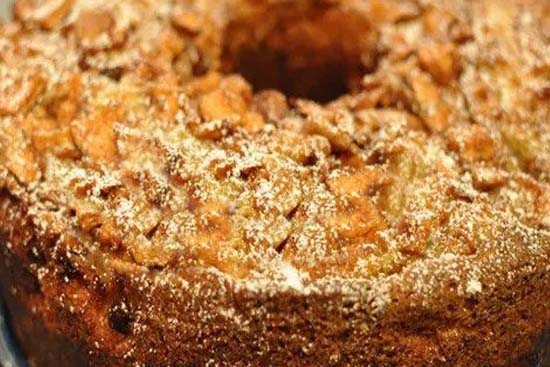
Serves: 10
Preparation time: 25 minutes
Cooking time:1 hour 10 minutes
1 1/4 cups oil 2 cups sugar
2 eggs beaten
3 cups flour
1 teaspoon baking soda
1/2 teaspoon salt
2 teaspoons vanilla
3 large apples, grated
1 cup nuts, chopped
Preheat oven to 350 degrees.
Grease and flour a large tube pan.
In a mixing bowl, mix first 3 ingredients well.
Add dry ingredients, then apples, nuts and vanilla.
Pour batter into prepared pan and bake for 1 hour and 15 minutes,
or until skewer inserted in center comes out clean.
Cool in pan on rack for 15 minutes.
Remove from pan and cool completely on rack.
Grease and flour a large tube pan.
In a mixing bowl, mix first 3 ingredients well.
Add dry ingredients, then apples, nuts and vanilla.
Pour batter into prepared pan and bake for 1 hour and 15 minutes,
or until skewer inserted in center comes out clean.
Cool in pan on rack for 15 minutes.
Remove from pan and cool completely on rack.
Dessert Apple sauce cake 
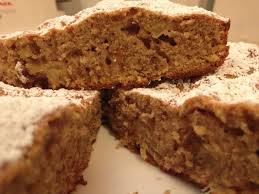
Serves: 8
Preparation time: 15 minutes
Cooking time:45 minutes
1/2 cup butter, softened 1 egg
1 cup molasses
2 1/4 cups flour
1 teaspoon salt
1 teaspoon baking soda
1 teaspoon cinnamon
1 cup apple sauce
3/4 cup raisins
Preheat oven to 350 degrees.
Cream butter and egg. Add molasses. Stir in dry ingredients, apple sauce, and raisins.
Bake in a buttered-floured 8-inch square dish 40 to 45 minutes.
Cream butter and egg. Add molasses. Stir in dry ingredients, apple sauce, and raisins.
Bake in a buttered-floured 8-inch square dish 40 to 45 minutes.
Dessert Apple strudel 
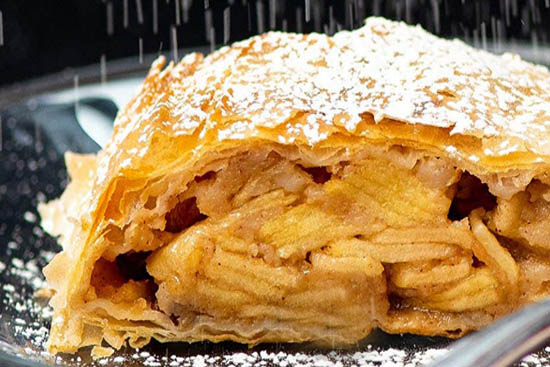
Serves: 8
Preparation time: 30 minutes
Cooking time:40 minutes
6 phyllo sheets 1/2 cup melted butter
3 cups diced apples, peeled and cored
1/2 cup raisins
3 tablespoons dark rum
1/2 cup dry bread crumbs
2 ounces melted butter
2 tablespoons brown sugar
1/2 cup chopped walnuts
1 teaspoon cinnamon
1 tablespoon lemon juice
1 tablespoon melted butter
confectioners's sugar
vanilla ice cream
Preheat oven to 400 degrees.
Brush phyllo leaves with melted butted.
Stack together to fit in a baking sheet.
Soak raisins in dark rum.
Brown dry bread crumbs with melted butter.
In a mixing bowl, combine apples, raisins, crumbs, brown sugar,
chopped walnuts, ground cinnamon, and lemon juice.
Mix ingredients well.
Spoon filling on the lower end of phyllo in a heap, lengthwise.
Roll strudel like a jelly roll. Brush top with 1 tablespoon melted butter.
Bake 40 to 45 minutes or until apples are soft.
Brush phyllo leaves with melted butted.
Stack together to fit in a baking sheet.
Soak raisins in dark rum.
Brown dry bread crumbs with melted butter.
In a mixing bowl, combine apples, raisins, crumbs, brown sugar,
chopped walnuts, ground cinnamon, and lemon juice.
Mix ingredients well.
Spoon filling on the lower end of phyllo in a heap, lengthwise.
Roll strudel like a jelly roll. Brush top with 1 tablespoon melted butter.
Bake 40 to 45 minutes or until apples are soft.
Dessert Banana cake 
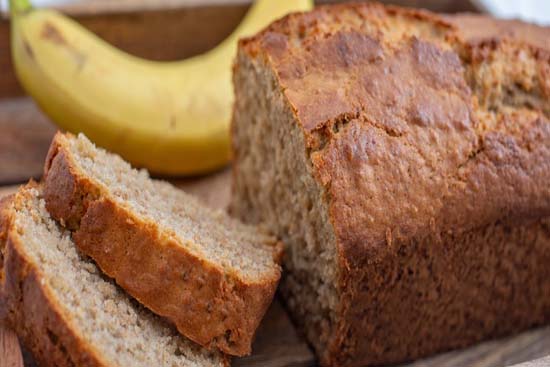
Serves: 16
Preparation time: 20 minutes
Cooking time:50 minutes
1/2 cup shortening 1 1/4 cups sugar
2 eggs
1 teaspoon vanilla
1/2 cup yogurt
2 1/4 cups flour, all purpose
2 teaspoons baking powder
1 teaspoon baking soda
1/2 teaspoon salt
1 1/2 cups banana, mashed
Preheat oven to 350 degrees.
Cream shortening and sugar.
Beat in the eggs vanilla and yogurt.
Crush the bananas. Sift the remaining dry ingredients. Add to batter. Mix in the bananas.
Grease and flour 2 (9-inch by 3-inch) loaf pans.
Bake for 40 to 50 minutes.
A cake tester inserted in center of cake should come out clean.
Cream shortening and sugar.
Beat in the eggs vanilla and yogurt.
Crush the bananas. Sift the remaining dry ingredients. Add to batter. Mix in the bananas.
Grease and flour 2 (9-inch by 3-inch) loaf pans.
Bake for 40 to 50 minutes.
A cake tester inserted in center of cake should come out clean.
Dessert Bee sting cake or bienenstich 
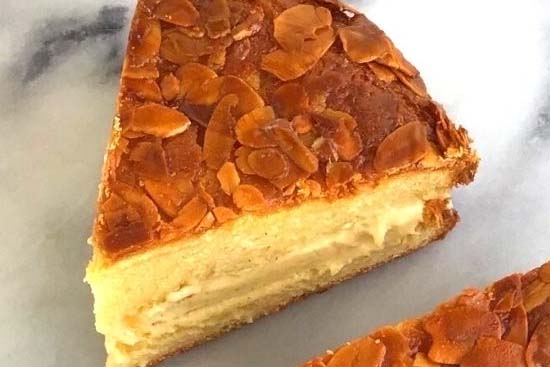
The base of this cake is an airy, buttery brioche. With a rich custard topped with honey glazed almonds similar to the Tropezienne, a specialty from the French Riviera.
Serves: 8
1/4 cup (55g) fine sugar
3 cups (450g) plain flour
5 large eggs
300g unsalted butter, cut into pieces and softened
Creme patisserie - pastry cream
4 egg yolks
1/3 cup (75g) sugar
1 tbs cornstarch
600ml whole milk
1 1/2 tsp vanilla extract
1 tbsp powdered gelatin or 3 gelatine leaves
Topping
70g unsalted butter
1/4 cup (55g) caster sugar
60g runny honey
100g slivered almonds
Serves: 8
Preparation time:1 hour
Cooking time:50 minutes
2 tablespooons dried yeast 1/4 cup (55g) fine sugar
3 cups (450g) plain flour
5 large eggs
300g unsalted butter, cut into pieces and softened
Creme patisserie - pastry cream
4 egg yolks
1/3 cup (75g) sugar
1 tbs cornstarch
600ml whole milk
1 1/2 tsp vanilla extract
1 tbsp powdered gelatin or 3 gelatine leaves
Topping
70g unsalted butter
1/4 cup (55g) caster sugar
60g runny honey
100g slivered almonds
Place yeast and 1 tsp sugar in a bowl with 200ml lukewarm water. Stir to combine and set aside for 5 minutes or until frothy.
Place flour and remaining 50g sugar in the bowl of a stand mixer with the dough hook and make a well in the centre of the flour mixture. Whisk eggs into yeast mixture, pour into the well and stir to combine. Knead on medium speed for 2-3 minutes until a dough forms. With the motor running, add butter, 1 piece at a time, until fully incorporated. Knead for a further 8-10 minutes until dough is smooth.
Transfer dough to a greased bowl, cover with plastic wrap and set aside for 1 hour 20 minutes or until doubled in size.
Preheat oven to 170°C. Grease a 20cm round cake pan and line the base with baking paper. Deflate the risen dough to release the air and knead into a smooth ball. Sprinkle the work surface with flour, roll out the dough using a rolling pin. Form a disc of 20 cm and 2 cm thick.
Place dough in the centre of the prepared pan and set aside for 20 minutes to proof. Bake for 50 minutes or until a skewer inserted in the centre comes out clean.
Combine the gelatin powder with 2 tablespoons of cold water. If using gelatin sheets, soak in cold water.
Meanwhile, for the creme patissiere, whisk egg yolks, sugar and cornstarch in a heatproof bowl until smooth. Place milk and vanilla in a saucepan over medium heat and bring to just below boiling point, then remove from heat. Pour hot milk mixture over egg mixture, whisking slowly until combined. Return mixture to the saucepan and place over medium heat. Cook, stirring constantly with a whisk, for 5-6 minutes to get a thick custard. Add the dissolved gelatin powder or the gelatine sheets without the water to creme patissiere and whisk until completely dissolved. Strain into a clean bowl, cover surface directly with plastic wrap and cool to room temperature, then refrigerate until cold.
Whisk crème patissiere until smooth. Transfer to a piping bag fitted with a wide fluted nozzle and chill until ready to use.
For the topping, combine butter, sugar, honey and a pinch of salt in a small saucepan. Cook over medium heat for 2-3 minutes until melted and combined. Stir in almonds, then set.
To assemble, use a large serrated knife to slice brioche in half horizontally. Pipe crème patissiere over the cut side of one half of brioche, then top with other half.
Reheat the topping over medium heat until almond are golden brown at which time, pour over the surface of the cake. serve immediately.
Place flour and remaining 50g sugar in the bowl of a stand mixer with the dough hook and make a well in the centre of the flour mixture. Whisk eggs into yeast mixture, pour into the well and stir to combine. Knead on medium speed for 2-3 minutes until a dough forms. With the motor running, add butter, 1 piece at a time, until fully incorporated. Knead for a further 8-10 minutes until dough is smooth.
Transfer dough to a greased bowl, cover with plastic wrap and set aside for 1 hour 20 minutes or until doubled in size.
Preheat oven to 170°C. Grease a 20cm round cake pan and line the base with baking paper. Deflate the risen dough to release the air and knead into a smooth ball. Sprinkle the work surface with flour, roll out the dough using a rolling pin. Form a disc of 20 cm and 2 cm thick.
Place dough in the centre of the prepared pan and set aside for 20 minutes to proof. Bake for 50 minutes or until a skewer inserted in the centre comes out clean.
Combine the gelatin powder with 2 tablespoons of cold water. If using gelatin sheets, soak in cold water.
Meanwhile, for the creme patissiere, whisk egg yolks, sugar and cornstarch in a heatproof bowl until smooth. Place milk and vanilla in a saucepan over medium heat and bring to just below boiling point, then remove from heat. Pour hot milk mixture over egg mixture, whisking slowly until combined. Return mixture to the saucepan and place over medium heat. Cook, stirring constantly with a whisk, for 5-6 minutes to get a thick custard. Add the dissolved gelatin powder or the gelatine sheets without the water to creme patissiere and whisk until completely dissolved. Strain into a clean bowl, cover surface directly with plastic wrap and cool to room temperature, then refrigerate until cold.
Whisk crème patissiere until smooth. Transfer to a piping bag fitted with a wide fluted nozzle and chill until ready to use.
For the topping, combine butter, sugar, honey and a pinch of salt in a small saucepan. Cook over medium heat for 2-3 minutes until melted and combined. Stir in almonds, then set.
To assemble, use a large serrated knife to slice brioche in half horizontally. Pipe crème patissiere over the cut side of one half of brioche, then top with other half.
Reheat the topping over medium heat until almond are golden brown at which time, pour over the surface of the cake. serve immediately.
Dessert Blackberry mousse terrine 
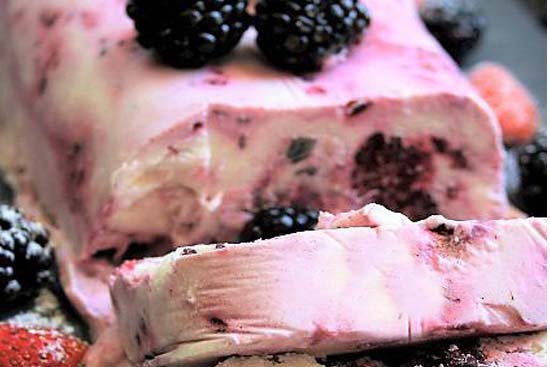
Serves: 10
Preparation time: 40 minutes
Cooking time:10 minutes
5 ½ cups blackberries or raspberries 2 teaspoons lemon juice
1 1/4 cups sugar
3 eggs
1 egg yolk
1/2 light sour cream
1 1/2 whipping cream
Reserve 1/2 cup berries for garnish.
In food processor or blender, purée remaining berries. Press through sieve into bowl to remove seeds and make about 2 cups. Stir in lemon juice.
In top of heatproof bowl over simmering water, stir 1 cup of the purée with 1 cup of the sugar. Add eggs and egg yolk; whisk for about 10 minutes or until thick enough to leave trail after whisk is pulled through the bowl. Let cool to room temperature. Fold in sour cream.
Whip cream until firm; fold into purée mixture. Pour into plastic wrap-lined 9x5-inch loaf pan; cover with plastic wrap.
Freeze for at least 8 hours or until solid. In food processor or blender, blend reserved purée and remaining sugar until sugar is dissolved. Uncover terrine and loosen at ends using hot knife; invert onto platter. Remove pan and plastic wrap. Slice using hot dry knife. Pool sauce onto plates; top with terrine. Garnish with reserved berries.
In food processor or blender, purée remaining berries. Press through sieve into bowl to remove seeds and make about 2 cups. Stir in lemon juice.
In top of heatproof bowl over simmering water, stir 1 cup of the purée with 1 cup of the sugar. Add eggs and egg yolk; whisk for about 10 minutes or until thick enough to leave trail after whisk is pulled through the bowl. Let cool to room temperature. Fold in sour cream.
Whip cream until firm; fold into purée mixture. Pour into plastic wrap-lined 9x5-inch loaf pan; cover with plastic wrap.
Freeze for at least 8 hours or until solid. In food processor or blender, blend reserved purée and remaining sugar until sugar is dissolved. Uncover terrine and loosen at ends using hot knife; invert onto platter. Remove pan and plastic wrap. Slice using hot dry knife. Pool sauce onto plates; top with terrine. Garnish with reserved berries.
Dessert Blueberry basic pie filling 
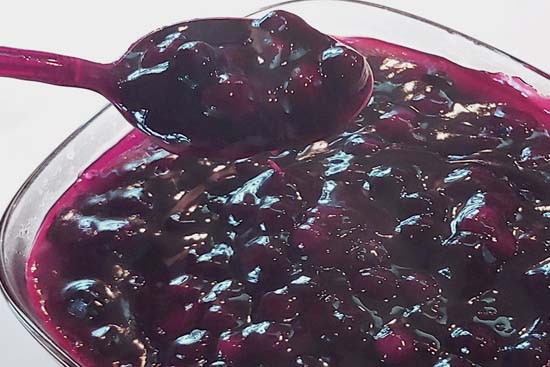
Serves: 8
Preparation time: 15 minutes
Cooking time:35 minutes
4 cups blueberries 1 cup sugar
1/3 cup cornstarch
1/4 cup lemon juice
Mix blueberries, sugar and lemon juice in a heavy saucepan.
Bring to boil, stirring frequently. Mix cornstarch with enough water to make a paste. Pour into the berry mixture, stirring constantly until thick. Cool.
The mixture can be cooled and stored orpPour into unbaked pie shell and bake at 400 degrees for about 35 minutes or until crust is golden.
Bring to boil, stirring frequently. Mix cornstarch with enough water to make a paste. Pour into the berry mixture, stirring constantly until thick. Cool.
The mixture can be cooled and stored orpPour into unbaked pie shell and bake at 400 degrees for about 35 minutes or until crust is golden.
Dessert Chocolate almond cake 
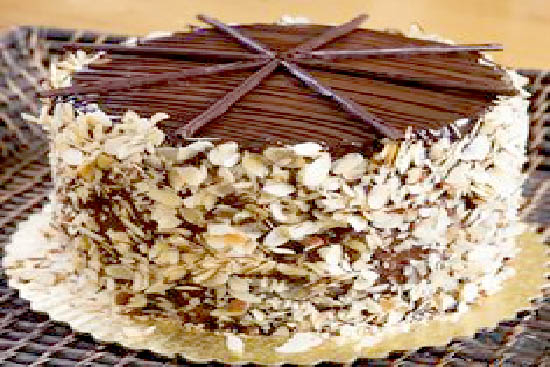
Serves: 8
Preparation time: 50 minutes
Cooking time:20 minutes
for the COCOA SPONGE CAKE: 1 teaspoon unsalted butter
1 teaspoon all purpose flour
4 egg whites
1/2 cup sugar
4 egg yolks
1/2 cup all purpose flour sifted together with 1/4 cup cocoa powder
for the cocoa syrup:
1/4 cup sugar
1 1/2 teaspoons cocoa powder
for the chocolate mousse filling:
10 ounces bittersweet chocolate
2 cups heavy cream, whipped until stiff
1/2 cups sliced almonds, toasted
3 ounces chocolate for curls
the cocoa sponge cake:
Preheat oven at 350 degrees. Butter and flour an 8-inch springform pan. With an electric mixer, beat the egg whites, slowly adding the sugar, and continue to whip until stiff.
Beat in the egg yolks, then gradually fold in the flour sifted together with cocoa powder. Pour the batter into the cake mold and bake for 15 to 18 minutes Remove from heat and unmold on a pastry rack to cool.
For the cocoa syrup:
Bring 1/4 cup of water, sugar, and cocoa powder to a boil in a small pot. Remove from heat and set aside.
For the chocolate mousse filling:
Melt the chocolate in the top of a double boiler. Cool until warm to touch. Fold in the whipped cream until smooth.
To assemble:
Place the cake on a round cake circle.
Split the cake horizontally into 2 equal disks with a serrated knife. Brush the bottom disk with half of the cocoa syrup.
Spread half of the chocolate filling over the cake, then sprinkle with half of the almonds. Cover with the top disk.
Repeat the same process with the syrup, filling, spreading some filling around the sides.
Decorate the sides with almonds, and the top with chocolate curls.
Preheat oven at 350 degrees. Butter and flour an 8-inch springform pan. With an electric mixer, beat the egg whites, slowly adding the sugar, and continue to whip until stiff.
Beat in the egg yolks, then gradually fold in the flour sifted together with cocoa powder. Pour the batter into the cake mold and bake for 15 to 18 minutes Remove from heat and unmold on a pastry rack to cool.
For the cocoa syrup:
Bring 1/4 cup of water, sugar, and cocoa powder to a boil in a small pot. Remove from heat and set aside.
For the chocolate mousse filling:
Melt the chocolate in the top of a double boiler. Cool until warm to touch. Fold in the whipped cream until smooth.
To assemble:
Place the cake on a round cake circle.
Split the cake horizontally into 2 equal disks with a serrated knife. Brush the bottom disk with half of the cocoa syrup.
Spread half of the chocolate filling over the cake, then sprinkle with half of the almonds. Cover with the top disk.
Repeat the same process with the syrup, filling, spreading some filling around the sides.
Decorate the sides with almonds, and the top with chocolate curls.
Dessert Chocolate creme caramel 
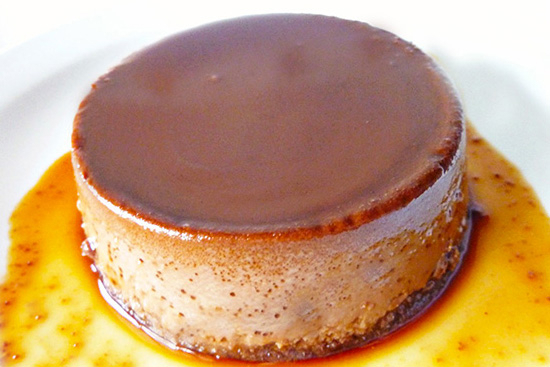
Serves: 8
Preparation time: 30 minutes
Cooking time:35 minutes
For caramel: 1/2 cup sugar
1/4 cup water
for custard:
6 ounces semisweet chocolate
2 cups milk
1 teaspoon vanilla extract
3 eggs
2 egg yolks
1/2 cup sugar
For caramel:
In a saucepan, combine 1/2 cup sugar and 1/4 cup water. When golden brown, carefully add 1/3 cup water to thin down. For custard: Preheat oven to 325 degrees.
Pour into 8 6-ounce ramekins to coat the bottom of the dishes evenly. Place the ramekins in a baking pan large enough to hold them without touching. Bring the milk to a boil in a medium saucepan. Pour in a mixing bowl. Add the chocolate and vanilla, and stir to melt.
In a large bowl, whisk the eggs and yolks with 1/2 cup sugar. Gradually whisk in the milk chocolate. Put through a strainer, then pour in the ramekins. Pour enough hot water into the pan to reach about half way up the sides of the ramekins. Bake for 30 to 35 minutes or until custards are just set in center. Transfer the ramekins to a rack to cool. Cover and refrigerate 3 hours or more.
To serve, run a knife around each custard, dip in hot water for about 2 minutes. Invert custards onto plates. Scrape bottom of ramekin molds and spoon caramel over the custard.
In a saucepan, combine 1/2 cup sugar and 1/4 cup water. When golden brown, carefully add 1/3 cup water to thin down. For custard: Preheat oven to 325 degrees.
Pour into 8 6-ounce ramekins to coat the bottom of the dishes evenly. Place the ramekins in a baking pan large enough to hold them without touching. Bring the milk to a boil in a medium saucepan. Pour in a mixing bowl. Add the chocolate and vanilla, and stir to melt.
In a large bowl, whisk the eggs and yolks with 1/2 cup sugar. Gradually whisk in the milk chocolate. Put through a strainer, then pour in the ramekins. Pour enough hot water into the pan to reach about half way up the sides of the ramekins. Bake for 30 to 35 minutes or until custards are just set in center. Transfer the ramekins to a rack to cool. Cover and refrigerate 3 hours or more.
To serve, run a knife around each custard, dip in hot water for about 2 minutes. Invert custards onto plates. Scrape bottom of ramekin molds and spoon caramel over the custard.
Dessert Chocolate mocha torte 
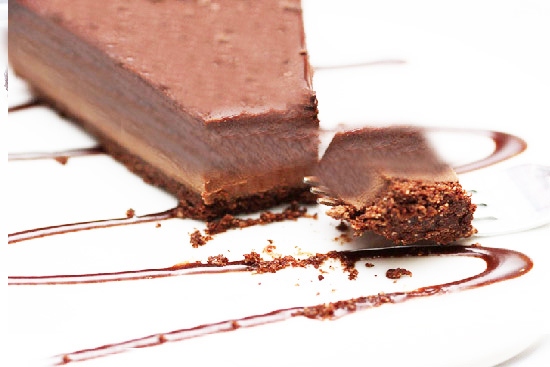
Serves: 14
Preparation time: 40 minutes
Cooking time:30 minutes
For the pecan layer: 2 1/2 cups pecan pieces
1/2 cup sugar
1/4 teaspoon salt
1/2 cup (1 stick) unsalted butter, melted
For the chocolate fudge layer
8 ounces semisweet chocolate, chopped
1 cup heavy cream
4 tablespoons (1/2 stick) unsalted butter, softened
2 tablespoons light corn syrup
For the mocha layer:
5 eggs at room temperature
1 1/2 cups light brown sugar
5 ounces unsweetened chocolate
2 teaspoons cornstarch
2 teaspoons instant coffee powder
1 cup (2 sticks) unsalted soft butter
Frosting:
2 1/2 cups heavy cream
3 ounce package instant vanilla pudding
2 tablespoons instant coffee powder
3/4 cup confectioner's sugar
Chocolate coffee beans
the pecan layer:
Butter the bottom and sides of a 10-inch spring form pan.
Chop pecans finely in a food processor. Combine with sugar, salt, and butter. Press the mixture evenly over the bottom of the pan. Bake 15 minutes at 350 degrees. Cover with plastic wrap, and refrigerate for an hour.
The chocolate fudge layer:
Melt chocolate and cream over a double boiler. Stir in the butter and corn syrup. Transfer mixture to a bowl.
Allow to cool, then spread over the pecan layer. Cover and refrigerate for an hour.
The mocha layer:
Combine eggs, sugar and cornstarch in a saucepan. Whisk over medium heat until thick and bubbly.
Remove from heat. Add the chocolate, and stir to melt. Dissolve the coffee in a tablespoon of hot water.
Add to the chocolate mixture. Blend in the butter. Spread mixture over the fudge layer. Cover and refrigerate for an hour or until very firm.
Frosting:
Whip the cream with the instant pudding until thick and firm. Gradually mix in the confectioner's sugar.
Dissolve the coffee in a tbsp of hot water. Cool coffee and blend in the whipped cream.
Remove the sides of the spring form. Frost the sides of torte with the mocha cream. Using a pastry bag fitted with a large star tip (such as ateco #4), pipe the remaining whipped mocha cream over the cake. Decorate with chocolate coffee beans
Butter the bottom and sides of a 10-inch spring form pan.
Chop pecans finely in a food processor. Combine with sugar, salt, and butter. Press the mixture evenly over the bottom of the pan. Bake 15 minutes at 350 degrees. Cover with plastic wrap, and refrigerate for an hour.
The chocolate fudge layer:
Melt chocolate and cream over a double boiler. Stir in the butter and corn syrup. Transfer mixture to a bowl.
Allow to cool, then spread over the pecan layer. Cover and refrigerate for an hour.
The mocha layer:
Combine eggs, sugar and cornstarch in a saucepan. Whisk over medium heat until thick and bubbly.
Remove from heat. Add the chocolate, and stir to melt. Dissolve the coffee in a tablespoon of hot water.
Add to the chocolate mixture. Blend in the butter. Spread mixture over the fudge layer. Cover and refrigerate for an hour or until very firm.
Frosting:
Whip the cream with the instant pudding until thick and firm. Gradually mix in the confectioner's sugar.
Dissolve the coffee in a tbsp of hot water. Cool coffee and blend in the whipped cream.
Remove the sides of the spring form. Frost the sides of torte with the mocha cream. Using a pastry bag fitted with a large star tip (such as ateco #4), pipe the remaining whipped mocha cream over the cake. Decorate with chocolate coffee beans
Dessert Cider apples 
Serves: 4
Preparation time: 15 minutes
Cooking time:10 minutes
3 tablespoons butter 2 large golden delicious apples, peeled, cored and sliced
2 Cortland apples, peeled, cored, sliced
3 tablespoons sugar
1/2 cup apple cider
1/8 teaspoon cinnamon
Melt butter in heavy skillet. add apple slices. sprinkle with sugar. Stir.
Cover and cook over medium heat, stirring from time to time, for 4 to 5 minutes.
Stir in apple cider and cinnamon.
Cover and cook, stirring occasionally, until apples are tender.
Remove cover and boil until syrup begins to thicken.
To serve:
Spoon warm apples into compote dishes.
Top each serving with a small scoop of frozen yogurt.
Delicious served over Brown sugar Pound cake.
Cover and cook over medium heat, stirring from time to time, for 4 to 5 minutes.
Stir in apple cider and cinnamon.
Cover and cook, stirring occasionally, until apples are tender.
Remove cover and boil until syrup begins to thicken.
To serve:
Spoon warm apples into compote dishes.
Top each serving with a small scoop of frozen yogurt.
Delicious served over Brown sugar Pound cake.
Dessert Country apple cake 
Serves: 6
Preparation time: 30 minutes
Cooking time:40 minutes
1/2 cup butter, softened 1/2 cup sugar
1 teaspoon vanilla
3 teaspoons milk
1/2 cup flour
1/4 cup cornstarch
3 eggs
1 teaspoon baking powder
1 teaspoon dark rum
1 pinch salt
3 large baking apples
Preheat oven to 350 degrees.
Cream in an electric mixer soft butter, sugar, and vanilla.
Mix in milk, flour, cornstarch. Beat in eggs one by one.
Stir in baking powder, rum, and salt.
Spoon in an 8-inch buttered round mold. Peel and slice 3 apples.
Stick slices in batter.
Bake 35 to 40 minutes.
Cream in an electric mixer soft butter, sugar, and vanilla.
Mix in milk, flour, cornstarch. Beat in eggs one by one.
Stir in baking powder, rum, and salt.
Spoon in an 8-inch buttered round mold. Peel and slice 3 apples.
Stick slices in batter.
Bake 35 to 40 minutes.
Dessert Dutch apple pie 
Serves: 8
Preparation time: 1 hour
Cooking time:1 hour
Pie Crust1¼ cups all-purpose flour, plus more for rolling out the dough
½ teaspoon salt
1 tablespoon sugar
3 tablespoons vegetable shortening or butter , chilled
4 tablespoons cold unsalted butter, cubed
4-5 tablespoons ice water
Apple Filling
5 large Granny Smith apples (about 2½ pounds)
4 large McIntosh apples (about 2 pounds)
¼ cup granulated sugar
½ teaspoon ground cinnamon
Pinch of salt
2 tablespoons unsalted butter
½ cup heavy cream
Streusel Topping
1¼ cups all-purpose flour
1/3 cup light brown sugar
1/3 cup granulated sugar
7 tablespoons unsalted butter, melted
1. For the pie crust: Process the flour, salt and sugar in a food processor until combined. Add the shortening or butter and process until the mixture has the texture of coarse sand, about 10 seconds. Scatter the butter pieces over the flour mixture; cut the butter into the flour until the mixture is pale yellow and resembles coarse crumbs, with butter bits no larger than small peas, about ten 1-second pulses. Sprinkle 4 tablespoons of the ice water over the mixture. Continue to pulse until the mixture comes together in a loose ball. Flatten the dough into a disk, wrap in plastic and refrigerate for at least 1 hour, or up to 2 days.
Note: If you do not have a food processor, use this method to make the pie dough: In a large bowl, whisk together the flour, sugar and salt. Scatter the shortening and butter over the dry ingredients and, using a pastry blender or your fingers, work the fat into the flour mixture until it looks like coarse sand. Then sprinkle the water over the mixture and use a fork to incorporate until it is evenly moistened and the dough will hold together when pinched between your fingers.
2. Remove the dough from the refrigerator. Roll the dough on a lightly floured work surface to a 12-inch circle. Transfer the dough to a 9-inch pie plate. Ease the dough into the pan corners. Trim the dough edges to extend about ½ inch beyond the rim of the pan. Fold the overhang under itself; flute the dough or press the tines of a fork against the dough to flatten it against the rim of the pie plate. Refrigerate the dough-lined pie plate until firm, about 40 minutes, then freeze until very cold, about 20 minutes.
3. Adjust an oven rack to the lower-middle position and hat the oven to 375 degrees F. Remove the dough-lined pie plate from the freeze, press a doubled 12-inch piece of heavy-duty foil inside the pie shell, and fold the edges of the foil to shield the fluted edge; distribute 2 cups ceramic or metal pie weights over the foil. Bake, leaving the foil and weights in place until the dough looks dry and is light in color, 25 to 30 minutes. Carefully remove the foil and weights. Continue baking until deep golden brown, about 12 minutes more. Transfer to a wire rack and increase the oven temperature to 425 degrees F.
4. For the apple filling: Peel, quarter, and core the apples; slice each quarter crosswise into pieces ¼ inch thick. Toss the apples, sugar, cinnamon, and salt in a large bowl to combine. Heat the butter in a large Dutch oven (or pot) over high heat until foaming subsides; add the apples and toss to coat. Reduce the hat to medium-high and cook, covered, stirring occasionally, until the Granny Smith apple slices are tender and the McIntosh apple slices are softened and beginning to break down, about 10 minutes.
5. Set a large colander over a large bowl; transfer the cooked apples to the colander. Shake the colander and toss the apples to drain off as much juice as possible. Bring the drained juice and the cram to a boil in the now-empty Dutch oven over high heat; cook, stirring occasionally, until thickened and a wooden spoon leaves a trail in the mixture, about 5 minutes. Transfer the apples to the prebaked pie shell; pour the reduced juice mixture over and smooth with a rubber spatula.
6. For the streusel topping: Combine the flour and sugars in a medium bowl; drizzle with the melted butter and toss with a fork until evenly moistened and the mixture forms many large chunks with pea-sized pieces mixed throughout. Sprinkle the streusel evenly over the pie filling. Set the pie plate on a baking sheet and bake until the streusel topping is deep golden brown, 10 to 20 minutes. Cool on a wire rack to room temperature and serve.
Note: If you do not have a food processor, use this method to make the pie dough: In a large bowl, whisk together the flour, sugar and salt. Scatter the shortening and butter over the dry ingredients and, using a pastry blender or your fingers, work the fat into the flour mixture until it looks like coarse sand. Then sprinkle the water over the mixture and use a fork to incorporate until it is evenly moistened and the dough will hold together when pinched between your fingers.
2. Remove the dough from the refrigerator. Roll the dough on a lightly floured work surface to a 12-inch circle. Transfer the dough to a 9-inch pie plate. Ease the dough into the pan corners. Trim the dough edges to extend about ½ inch beyond the rim of the pan. Fold the overhang under itself; flute the dough or press the tines of a fork against the dough to flatten it against the rim of the pie plate. Refrigerate the dough-lined pie plate until firm, about 40 minutes, then freeze until very cold, about 20 minutes.
3. Adjust an oven rack to the lower-middle position and hat the oven to 375 degrees F. Remove the dough-lined pie plate from the freeze, press a doubled 12-inch piece of heavy-duty foil inside the pie shell, and fold the edges of the foil to shield the fluted edge; distribute 2 cups ceramic or metal pie weights over the foil. Bake, leaving the foil and weights in place until the dough looks dry and is light in color, 25 to 30 minutes. Carefully remove the foil and weights. Continue baking until deep golden brown, about 12 minutes more. Transfer to a wire rack and increase the oven temperature to 425 degrees F.
4. For the apple filling: Peel, quarter, and core the apples; slice each quarter crosswise into pieces ¼ inch thick. Toss the apples, sugar, cinnamon, and salt in a large bowl to combine. Heat the butter in a large Dutch oven (or pot) over high heat until foaming subsides; add the apples and toss to coat. Reduce the hat to medium-high and cook, covered, stirring occasionally, until the Granny Smith apple slices are tender and the McIntosh apple slices are softened and beginning to break down, about 10 minutes.
5. Set a large colander over a large bowl; transfer the cooked apples to the colander. Shake the colander and toss the apples to drain off as much juice as possible. Bring the drained juice and the cram to a boil in the now-empty Dutch oven over high heat; cook, stirring occasionally, until thickened and a wooden spoon leaves a trail in the mixture, about 5 minutes. Transfer the apples to the prebaked pie shell; pour the reduced juice mixture over and smooth with a rubber spatula.
6. For the streusel topping: Combine the flour and sugars in a medium bowl; drizzle with the melted butter and toss with a fork until evenly moistened and the mixture forms many large chunks with pea-sized pieces mixed throughout. Sprinkle the streusel evenly over the pie filling. Set the pie plate on a baking sheet and bake until the streusel topping is deep golden brown, 10 to 20 minutes. Cool on a wire rack to room temperature and serve.
Dessert Flambeed bananas 
Serves: 4
Preparation time: 15 minutes
Cooking time:10 minutes
1/3 cup dark brown sugar 2 teaspoons butter
1 teaspoon lemon juice
1/2 cup dark rum or bourbon
4 medium bananas, peeled and cut in halves
2 teaspoons butter
1/4 cup toasted sliced almonds
In a saucepan, combine the sugar, butter, and lemon juice.
Heat to melt butter. Add 1/4 cup rum.
Fry the bananas in butter until golden brown. Pour sauce over, and cook until tender.
Arrange bananas on a serving dish. Heat remaining rum. Ignite and pour over bananas.
Sprinkle with toasted almonds. Serve with rum and raisin ice cream, or cinnamon ice cream.
Heat to melt butter. Add 1/4 cup rum.
Fry the bananas in butter until golden brown. Pour sauce over, and cook until tender.
Arrange bananas on a serving dish. Heat remaining rum. Ignite and pour over bananas.
Sprinkle with toasted almonds. Serve with rum and raisin ice cream, or cinnamon ice cream.
Dessert Flamed apples 
Serves: 4
Preparation time: 20 minutes
Cooking time:15 minutes
4 large apples 1 ounce butter
4 teaspoons sugar
2 teaspoons apricot preserves
4 teaspoons Calvados or brandy
Vanilla ice cream
Peel, core, and cut apples into small wedges.
Melt the butter in a large frying pan. Add apples with the sugar.
Sauté until sugar starts to caramelize.
Mix in the apricot preserves.
Continue cooking for a minute, then add the Calvados or brandy.
Ignite and serve with vanilla ice cream.
Melt the butter in a large frying pan. Add apples with the sugar.
Sauté until sugar starts to caramelize.
Mix in the apricot preserves.
Continue cooking for a minute, then add the Calvados or brandy.
Ignite and serve with vanilla ice cream.
Dessert Jelly-filled pears in puff pastry with caramel sauce 
Serves: 4
Preparation time: 40 minutes
Cooking time:30 minutes
For the sauce: 1 1/3 cups sugar
1/2 cup water
1 cup whipping cream
1 teaspoon Calvados
Pears:
4 small bartlet pears, peeled (About 5 oz each)
4 teaspoons red currant jelly
1 pound puff pastry sheets
1 egg yolk, beaten for glaze
Vanilla ice cream (optional)
For the sauce:
Stir sugar and water in a saucepan over medium heat until sugar dissolves.
Increase heat and boil until syrup turns deep-amber color. Remove from heat.
Carefully stir in cream (mixture will bubble vigorously). Cool. Stir in calvados. (can be made 1 or 2 days ahead.) Cover and chill.
For pears:
Cut off top of 1½ inches from stem end of the pears and reserve.
Core each pear through top, leaving bottom intact. Spoon 1 teaspoon jelly into hole of each pear. Replace stem end.
Roll out puff pastry about ¼ inch thick. Cut out 4 8-inch rounds and 4 2-inch rounds.
Place pear in center of each 8-inch pastry round. Gather pastry around each pear and pinch pastry to hold in place. Brush pastry with egg glaze.
Make hole in center of each 2-inch pastry round. Fit 1 round over stem of each pear to form top.
Press firmly against pastry bottom to seal.
Brush pastry top with egg glaze. Cut out 4 small leaves from pastry scraps. Brush with egg and place 1 leaf just below stem of each pear.
Refrigerate for 1 hour. Preheat oven to 400 degrees. Butter baking sheet.
Place pears on sheet and bake until pastry is golden brown, about 25 min.
Rewarm caramel sauce, stirring frequently. Spoon sauce over 4 plates.
Place hot pear in center of each plate. Serve with scoops of vanilla ice cream if desired.
Stir sugar and water in a saucepan over medium heat until sugar dissolves.
Increase heat and boil until syrup turns deep-amber color. Remove from heat.
Carefully stir in cream (mixture will bubble vigorously). Cool. Stir in calvados. (can be made 1 or 2 days ahead.) Cover and chill.
For pears:
Cut off top of 1½ inches from stem end of the pears and reserve.
Core each pear through top, leaving bottom intact. Spoon 1 teaspoon jelly into hole of each pear. Replace stem end.
Roll out puff pastry about ¼ inch thick. Cut out 4 8-inch rounds and 4 2-inch rounds.
Place pear in center of each 8-inch pastry round. Gather pastry around each pear and pinch pastry to hold in place. Brush pastry with egg glaze.
Make hole in center of each 2-inch pastry round. Fit 1 round over stem of each pear to form top.
Press firmly against pastry bottom to seal.
Brush pastry top with egg glaze. Cut out 4 small leaves from pastry scraps. Brush with egg and place 1 leaf just below stem of each pear.
Refrigerate for 1 hour. Preheat oven to 400 degrees. Butter baking sheet.
Place pears on sheet and bake until pastry is golden brown, about 25 min.
Rewarm caramel sauce, stirring frequently. Spoon sauce over 4 plates.
Place hot pear in center of each plate. Serve with scoops of vanilla ice cream if desired.
Dessert Meringue apple tart 
Serves: 8
Preparation time: 30 minutes
Cooking time:40 minutes
1 9-inch unbaked pie shell 3 pounds apples, peeled, cored, and sliced
1 teaspoon butter, in small pieces
1/2 teaspoon cinnamon
4 egg whites
1/2 teaspoon cream of tartar
6 ounces powdered sugar
Preheat oven to 350 degrees.
Fill the pie shell with apple slices. Scatter dots of butter over apples.
Sprinkle with cinnamon. Bake until apples are cooked.
Beat egg whites with cream of tartar until medium stiff.
Continue beating and gradually add the sugar. Beat until firm.
Cover pie with meringue. Bake until meringue is golden brown.
Cool. Serve at room temperature.
I like it with cinnamon ice cream.
Fill the pie shell with apple slices. Scatter dots of butter over apples.
Sprinkle with cinnamon. Bake until apples are cooked.
Beat egg whites with cream of tartar until medium stiff.
Continue beating and gradually add the sugar. Beat until firm.
Cover pie with meringue. Bake until meringue is golden brown.
Cool. Serve at room temperature.
I like it with cinnamon ice cream.
Dessert Peach-raspberry beggars purses 
Serves: 8
Preparation time: 40 minutes
Cooking time:25 minutes
Sauce: 1/2 cup heavy cream
1/2 cup milk
1/2 teaspoon grated orange rind
3 large egg yolks
1/4 cup sugar
Filling:
1 pound peaches, peeled, chopped
1/2 cup raspberries
2 1/2 tablespoons sugar
8 teaspoons sugar
1 teaspoon cinnamon
2 tablespoons flour
1/2 teaspoon fresh lemon juice
1 large egg white, whisked
1 package frozen puff pastry (2 sheets)
For sauce:
Combine cream, milk, and orange in heavy saucepan. Bring to simmer. Remove from heat and let steep for 15 minutes, covered. Whisk yolks and sugar. Gradually whisk warm milk mixture into yolk mixture; return to saucepan. Cook over low heat until mixture coats the back of a spoon, stirring constantly (do not boil).
Pour into bowl and chill until cold, whisking occasionally.
For filling:
Line a baking sheet with parchment paper and spray with non-stick spray. Roll out one pastry sheet to 14-inch square. Cut our 4 circles each measuring 5-inches in diameter. Place circles on prepared sheet and cover with plastic. Repeat with remaining pastry sheet. Place circles atop plastic on same baking sheet. Freeze 10 minutes.
Toss peaches, raspberries, 2 1/2 tablespoons sugar, flour and lemon juice. Roll out pastry circles to 7-inch diameter rounds. Place 1/4 cup of fruit mixture in centre of each round. Gather dough atop fruit and twist and pinch firmly to enclose completely.
Place on large baking sheet. Freeze bundles for 15 minutes. Preheat oven to 400 degrees. Brush purses all over with egg white, and sprinkle each lightly with sugar cinnamon mixture.
Bake until golden, about 20 minutes. Cool at least 10 minutes. Place 2 tablespoons sauce in centre of each plate. Place one purse in centre and serve warm.
Combine cream, milk, and orange in heavy saucepan. Bring to simmer. Remove from heat and let steep for 15 minutes, covered. Whisk yolks and sugar. Gradually whisk warm milk mixture into yolk mixture; return to saucepan. Cook over low heat until mixture coats the back of a spoon, stirring constantly (do not boil).
Pour into bowl and chill until cold, whisking occasionally.
For filling:
Line a baking sheet with parchment paper and spray with non-stick spray. Roll out one pastry sheet to 14-inch square. Cut our 4 circles each measuring 5-inches in diameter. Place circles on prepared sheet and cover with plastic. Repeat with remaining pastry sheet. Place circles atop plastic on same baking sheet. Freeze 10 minutes.
Toss peaches, raspberries, 2 1/2 tablespoons sugar, flour and lemon juice. Roll out pastry circles to 7-inch diameter rounds. Place 1/4 cup of fruit mixture in centre of each round. Gather dough atop fruit and twist and pinch firmly to enclose completely.
Place on large baking sheet. Freeze bundles for 15 minutes. Preheat oven to 400 degrees. Brush purses all over with egg white, and sprinkle each lightly with sugar cinnamon mixture.
Bake until golden, about 20 minutes. Cool at least 10 minutes. Place 2 tablespoons sauce in centre of each plate. Place one purse in centre and serve warm.
Dessert Poppy seed chocolate torte 
30 minutes
Serves: 10
3/4 cup sugar
6 tablespoons unsalted butter, room temperature
1 teaspoon vanilla extract
6 large eggs, separated
1/2 cup poppy seeds, ground (about 3 1/2 ounces)
2 tablespoons flour
powdered sugar
whipped cream
Serves: 10
Preparation time: 20 minutes
Cooking time:45 minutes
4 ounces bittersweet chocolate, chopped 3/4 cup sugar
6 tablespoons unsalted butter, room temperature
1 teaspoon vanilla extract
6 large eggs, separated
1/2 cup poppy seeds, ground (about 3 1/2 ounces)
2 tablespoons flour
powdered sugar
whipped cream
Preheat oven to 350 degrees.
Generously butter and flour 9-inch springform pan.
Melt chocolate in top of double boiler over simmering water, stirring chocolate until smooth.
Remove chocolate from over water.
Cool chocolate 10 minutes. Beat 3/4 cup sugar, butter and vanilla extract to blend.
Add egg yolks 1 at a time, beating well after each addition. Add melted chocolate; beat until just combined. Mix in poppy seeds.
Beat egg whites until stiff but not dry.
Fold half of beaten egg whites into chocolate mixture.
Fold flour into remaining beaten whites. Fold egg white mixture into chocolate mixture.
Pour batter into prepared pan. Spread to level.
Bake until tester inserted in center of torte comes out clean, about 45 minutes. Transfer pan to rack and cool completely.
Remove pan sides.
Sift powdered sugar over torte. Serve with whipped cream.
Generously butter and flour 9-inch springform pan.
Melt chocolate in top of double boiler over simmering water, stirring chocolate until smooth.
Remove chocolate from over water.
Cool chocolate 10 minutes. Beat 3/4 cup sugar, butter and vanilla extract to blend.
Add egg yolks 1 at a time, beating well after each addition. Add melted chocolate; beat until just combined. Mix in poppy seeds.
Beat egg whites until stiff but not dry.
Fold half of beaten egg whites into chocolate mixture.
Fold flour into remaining beaten whites. Fold egg white mixture into chocolate mixture.
Pour batter into prepared pan. Spread to level.
Bake until tester inserted in center of torte comes out clean, about 45 minutes. Transfer pan to rack and cool completely.
Remove pan sides.
Sift powdered sugar over torte. Serve with whipped cream.
Dessert Prune kumquat sticky pudding with armagnac toffee sauce 
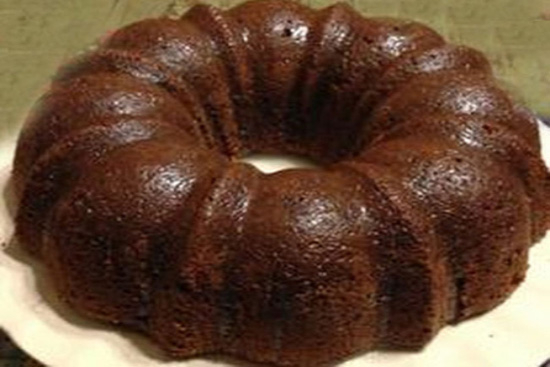
The rich flavors in this moist cake intensify with a little bit of age. Though the Armagnac toffee sauce and Armagnac ice cream make festive partners, leftover cake is excellent served plain with tea or coffee.
Serves: 10
1/2 cup Armagnac
1 1/4 cups water
6 kumquats
1 1/2 cups granulated sugar
3 cups all-purpose flour
1 1/4 teaspoons baking soda
1 teaspoon ground ginger
1/2 teaspoon ground allspice
3/4 teaspoon salt
2 sticks (1 cup) unsalted butter, softened
1 1/4 cups packed light brown sugar
4 large eggs
1 teaspoon vanilla
Garnish: kumquats (preferably with leaves)
Accompaniments:
Armagnac toffee sauce
Armagnac ice cream
Serves: 10
Preparation time: 40 minutes
Cooking time:1 hour 10 minutes
1 3/4 cups packed pitted prunes (about 14 ounces)1/2 cup Armagnac
1 1/4 cups water
6 kumquats
1 1/2 cups granulated sugar
3 cups all-purpose flour
1 1/4 teaspoons baking soda
1 teaspoon ground ginger
1/2 teaspoon ground allspice
3/4 teaspoon salt
2 sticks (1 cup) unsalted butter, softened
1 1/4 cups packed light brown sugar
4 large eggs
1 teaspoon vanilla
Garnish: kumquats (preferably with leaves)
Accompaniments:
Armagnac toffee sauce
Armagnac ice cream
Preheat oven to 350°F and generously butter an 11-cup Kugelhopf pan or 11-cup bundt pan.
Halve prunes and in a small saucepan simmer with Armagnac and 3/4 cup water, uncovered, 5 minutes. With a slotted spoon transfer prunes to a shallow dish to cool. Boil Armagnac mixture until reduced to about 1/2 cup and add to prunes.
Halve kumquats lengthwise and thinly slice crosswise. In a small saucepan bring remaining 1/2 cup water with 1/4 cup granulated sugar to a simmer, stirring until sugar is dissolved. Add kumquats and simmer 10 minutes. In a fine sieve drain kumquats and add to prunes.
Into a bowl sift together flour, baking soda, ginger, allspice, and salt. Resift mixture into another bowl.
In a large bowl with an electric mixer beat together butter, remaining 1 1/4 cups granulated sugar, and brown sugar until light and fluffy. Add eggs 1 at a time, beating well after each addition, and beat in vanilla. Add flour mixture and prune mixture alternately in batches, beginning and ending with flour mixture and beating until just combined.
Spoon batter into pan (pan will be almost full) and bake in middle of oven 1 hour and 10 minutes, or until a tester comes out clean. Cool cake in pan on a rack 10 minutes and turn out onto rack to cool completely. Cake keeps, wrapped in plastic wrap, at room temperature 1 week.
Garnish cake with kumquats and serve with warm toffee sauce and Armagnac ice cream
Halve prunes and in a small saucepan simmer with Armagnac and 3/4 cup water, uncovered, 5 minutes. With a slotted spoon transfer prunes to a shallow dish to cool. Boil Armagnac mixture until reduced to about 1/2 cup and add to prunes.
Halve kumquats lengthwise and thinly slice crosswise. In a small saucepan bring remaining 1/2 cup water with 1/4 cup granulated sugar to a simmer, stirring until sugar is dissolved. Add kumquats and simmer 10 minutes. In a fine sieve drain kumquats and add to prunes.
Into a bowl sift together flour, baking soda, ginger, allspice, and salt. Resift mixture into another bowl.
In a large bowl with an electric mixer beat together butter, remaining 1 1/4 cups granulated sugar, and brown sugar until light and fluffy. Add eggs 1 at a time, beating well after each addition, and beat in vanilla. Add flour mixture and prune mixture alternately in batches, beginning and ending with flour mixture and beating until just combined.
Spoon batter into pan (pan will be almost full) and bake in middle of oven 1 hour and 10 minutes, or until a tester comes out clean. Cool cake in pan on a rack 10 minutes and turn out onto rack to cool completely. Cake keeps, wrapped in plastic wrap, at room temperature 1 week.
Garnish cake with kumquats and serve with warm toffee sauce and Armagnac ice cream
Dessert Prune soufflés 
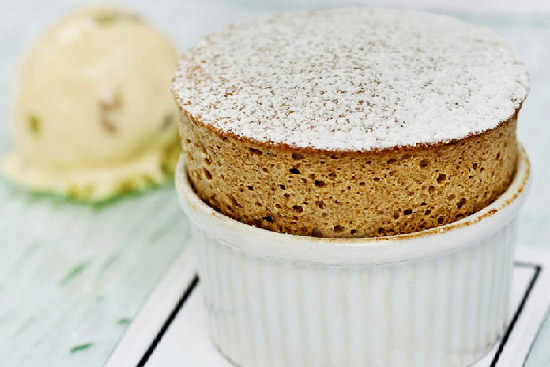
Serves: 6
Preparation time: 30 minutes
Cooking time:15 minutes
6-6 ounce soufflé molds 1 teaspoon sugar
1 teaspoon soft butter
1 cup pitted prunes
1 cup water
1 teaspoon Brandy (optional)
1 teaspoon grated lemon rind
1/2 cup chopped walnuts, or pecans
4 egg whites
1/4 cup sugar
1/4 teaspoon cream of tartar
Preheat oven to 375 degrees . Butter the inside of the small soufflé molds. Coat with sugar. Do not touch the inside. In a medium pot, stew the prunes in water, Brandy (optional), and lemon rind until the moisture is evaporated by half. Purée the prunes in a food processor. Transfer to a medium mixing bowl. Mix in the chopped nuts. Set aside to cool at room temperature. (can be prepared 2 hours in advance up to this point.)
In an electric mixing bowl, whip the egg whites with the cream of tartar. When they reach a soft peaks, gradually add the sugar, and continue beating until the whites are firm and fluffy.
Fold the egg whites into the prune mixture . Fill the mold with the soufflé mixture. Level the soufflé mixture with a spatula. Bake on a baking sheet for 12 to 15 minutes.
Note:
You may also us 1/2 prunes 1/2 dried apricots.
Also, soak prune in tea. Then Armagnac.
In an electric mixing bowl, whip the egg whites with the cream of tartar. When they reach a soft peaks, gradually add the sugar, and continue beating until the whites are firm and fluffy.
Fold the egg whites into the prune mixture . Fill the mold with the soufflé mixture. Level the soufflé mixture with a spatula. Bake on a baking sheet for 12 to 15 minutes.
Note:
You may also us 1/2 prunes 1/2 dried apricots.
Also, soak prune in tea. Then Armagnac.
Dessert Rhubarb tart with orange-ginger glaze 
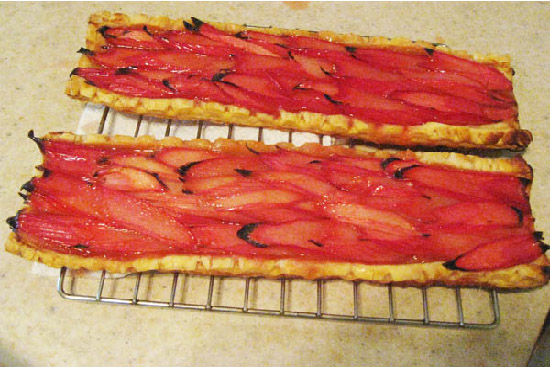
Serves: 6
Preparation time: 30 minutes
Cooking time:30 minutes
1 cup fresh orange juice1/2 teaspoon grated ginger
1 tablespoon fresh lime juice
1/2 cup sugar
3/4 pound red rhubarb stalks, unpeeled and thinly sliced diagonally (1/8 inch)
1 sheet frozen puff pastry (from a 17 1/4-ounces package), thawed
1/2 teaspoon grated orange zest
Accompaniment: vanilla ice cream
Preheat oven to 400°F with rack in middle.
Stir together orange juice, grated ginger, lime juice, and sugar in a bowl. Add rhubarb and let stand, stirring occasionally, 10 minutes.
Meanwhile, cut pastry in half lengthwise, then roll out each piece into an 11-by 7-inch rectangle on a lightly floured surface with a floured rolling pin. Arrange pastry rectangles side by side on an ungreased large baking sheet.
Make a 1/2-inch border around each pastry rectangle by lightly scoring a line parallel to each edge. Prick pastry inside border all over with a fork.
Strain rhubarb mixture through a sieve set over a bowl, reserving liquid. Top 1 pastry rectangle (within border) with half of rhubarb, overlapping slices slightly. Repeat with remaining pastry and rhubarb.
Bake until pastry is puffed and golden (underside of pastry should also be golden), about 30 minutes.
Meanwhile, boil reserved rhubarb liquid in a small saucepan, skimming foam if necessary, until reduced to about 1/4 cup, 15 to 18 minutes. The glaze will become medium thick
Transfer tarts to a rack. Brush rhubarb and pastry with glaze and sprinkle with zest.
Stir together orange juice, grated ginger, lime juice, and sugar in a bowl. Add rhubarb and let stand, stirring occasionally, 10 minutes.
Meanwhile, cut pastry in half lengthwise, then roll out each piece into an 11-by 7-inch rectangle on a lightly floured surface with a floured rolling pin. Arrange pastry rectangles side by side on an ungreased large baking sheet.
Make a 1/2-inch border around each pastry rectangle by lightly scoring a line parallel to each edge. Prick pastry inside border all over with a fork.
Strain rhubarb mixture through a sieve set over a bowl, reserving liquid. Top 1 pastry rectangle (within border) with half of rhubarb, overlapping slices slightly. Repeat with remaining pastry and rhubarb.
Bake until pastry is puffed and golden (underside of pastry should also be golden), about 30 minutes.
Meanwhile, boil reserved rhubarb liquid in a small saucepan, skimming foam if necessary, until reduced to about 1/4 cup, 15 to 18 minutes. The glaze will become medium thick
Transfer tarts to a rack. Brush rhubarb and pastry with glaze and sprinkle with zest.
Dessert Strawberry linzertorte 
Serves: 8
Preparation time: 40 minutes
Cooking time:1 hour
For filling:1 orange
1 lemon
1 vanilla bean, split lengthwise
3 1-pint baskets strawberries, hulled, washed, halved
1 3/4 cups sugar
1 tablespoon chopped fresh ginger
1/8 teaspoon ground black pepper
For pastry:
2/3 cup+2 teaspoons sugar
1/2 cup hazelnuts, toasted
1/2 cup whole almonds, toasted
2 1/2 cups flour
1 teaspoon ground cinnamon
1 teaspoon ground ginger
1/4 teaspoon salt
1/8 teaspoon ground nutmeg
1 cup unsalted butter, cut into pieces
1/4 cup whipping cream
3 large egg yolks
1 egg, beaten with
1 teaspoon cream
For a 9-inch tart pan with removable bottom.
Filling:
Remove peel and pith from oranges and lemon. Cut into 1/2-inch pieces, discarding seeds. Place in a large pot or Dutch oven. Scrape in seeds from vanilla bean; add bean. Add strawberries, sugar, chopped fresh ginger and pepper. Bring to a boil while stirring. Cook over medium heat until thick and reduced to 2 cups.
Transfer filling to a bowl. Cover and refrigerate. (can be made 3 days ahead).
Dough:
Preheat oven at 350 degrees. Process 2/3 cup sugar, hazelnuts and almonds in processor until ground. Add flour, cinnamon, ginger, salt and nutmeg, and blend. Add butter and process until mixture resembles coarse meal.
Beat 1/4 cup cream and egg yolks in a small bowl. Add to dough and process to form moist clumps. Turn out dough to work surface. Knead until smooth. Divide in 3 equal parts.
Flatten into disks. Wrap in plastic. Chill. (can be made a day ahead.)
Roll out one disk to 11-inch round. Transfer dough to tart pan. Press dough into place. Trim edges. Chill crust until firm.
Meanwhile, roll out another dough disk to 11-inch round. Cut 16 1/2-inch wide-strips. (Reserve remaining dough disk for another use.)
Spoon filling into crust.
Arrange 8 dough strips across filling, spacing evenly. Arrange 8 dough strips in opposite direction across filling, creating a lattice pattern.
Press dough strips at edges to seal strips to crust bottom. Trim strip ends. Brush glaze over lattice top. Sprinkle with 2 tablespoons sugar.
Bake torte until golden brown and very firm to touch, and filling begins to bubble, about 1 hour. Let cool in pan on rack for 20 minutes.
Gently push bottom of pan up, freeing torte from pan sides; let torte settle back into pan. Cool in pan on rack. (can be made 8 hours ahead.)
Filling:
Remove peel and pith from oranges and lemon. Cut into 1/2-inch pieces, discarding seeds. Place in a large pot or Dutch oven. Scrape in seeds from vanilla bean; add bean. Add strawberries, sugar, chopped fresh ginger and pepper. Bring to a boil while stirring. Cook over medium heat until thick and reduced to 2 cups.
Transfer filling to a bowl. Cover and refrigerate. (can be made 3 days ahead).
Dough:
Preheat oven at 350 degrees. Process 2/3 cup sugar, hazelnuts and almonds in processor until ground. Add flour, cinnamon, ginger, salt and nutmeg, and blend. Add butter and process until mixture resembles coarse meal.
Beat 1/4 cup cream and egg yolks in a small bowl. Add to dough and process to form moist clumps. Turn out dough to work surface. Knead until smooth. Divide in 3 equal parts.
Flatten into disks. Wrap in plastic. Chill. (can be made a day ahead.)
Roll out one disk to 11-inch round. Transfer dough to tart pan. Press dough into place. Trim edges. Chill crust until firm.
Meanwhile, roll out another dough disk to 11-inch round. Cut 16 1/2-inch wide-strips. (Reserve remaining dough disk for another use.)
Spoon filling into crust.
Arrange 8 dough strips across filling, spacing evenly. Arrange 8 dough strips in opposite direction across filling, creating a lattice pattern.
Press dough strips at edges to seal strips to crust bottom. Trim strip ends. Brush glaze over lattice top. Sprinkle with 2 tablespoons sugar.
Bake torte until golden brown and very firm to touch, and filling begins to bubble, about 1 hour. Let cool in pan on rack for 20 minutes.
Gently push bottom of pan up, freeing torte from pan sides; let torte settle back into pan. Cool in pan on rack. (can be made 8 hours ahead.)
Dessert Vanilla custards 
Serves: 8
Preparation time:15 minutes
Cooking time:30 minutes
8 egg yolks 3/4 cup sugar
1 teaspoon vanilla
3 1/2 cups milk
Preheat oven to 350 degrees. In a mixing bowl whisk the eggs and sugar till creamy and lemony.
Bring the milk to the boiling point. Gradually whisk in the egg mixture. Stir in vanilla. Strain and pour custard mixture into individual ramekin dishes. Bake in a water bath for about 25 minutes. or until set.
Bring the milk to the boiling point. Gradually whisk in the egg mixture. Stir in vanilla. Strain and pour custard mixture into individual ramekin dishes. Bake in a water bath for about 25 minutes. or until set.
Dessert Whipped cream chocolate icing 
Serves: 12
Preparation time: 10 minutes
2 1/2 cups whipping cream 1 3-ounce package instant chocolate pudding
1/2 cup confectioner's sugar
Whip the cream with the instant chocolate pudding and confectioner's sugar until thick and creamy.
Use one half in cake layers and remaining to ice top and sides.
Use a hot knife to get the icing smooth.
To decorate the cake, melt 6 ounces chocolate and transfer to a small paper or plastic bag fitted with a tiny opening. Decorate the cake.
**For an 8 inch cake use 1/2 of the recipe.
Use one half in cake layers and remaining to ice top and sides.
Use a hot knife to get the icing smooth.
To decorate the cake, melt 6 ounces chocolate and transfer to a small paper or plastic bag fitted with a tiny opening. Decorate the cake.
**For an 8 inch cake use 1/2 of the recipe.
conversion of liquids
Weights
Temperatures
Measures of non liquid ingredients
Non-liquid ingredients in volume converted
|
|||||||
|---|---|---|---|---|---|---|---|
Ingredient |
1 cup |
3/4 cup |
2/3 cup |
1/2 cup |
1/3 cup |
1/4 cup |
2 tablespoons |
| All-purpose wheat flour | 120 g | 90 g | 80 g | 60 g | 40 g | 30 g | 15 g |
| All-purpose sifted wheat flour | 110 g | 80 g | 70 g | 55 g | 35 g | 27 g | 13 g |
| White sugar | 200 g | 150 g | 130 g | 100 g | 65 g | 50 g | 25 g |
| Powdered sugar/Icing sugar | 100 g | 75 g | 70 g | 50 g | 35 g | 25 g | 13 g |
| Brown sugar normally packed | 180 g | 135 g | 120 g | 90 g | 60 g | 45 g | 23 g |
| Corn flour | 160 g | 120 g | 100 g | 80 g | 50 g | 40 g | 20 g |
| Cornstarch | 120 g | 90 g | 80 g | 60 g | 40 g | 30 g | 15 g |
| Rice (not-cooked) | 190 g | 140 g | 125 g | 95 g | 65 g | 48 g | 24 g |
| Macaroni (uncooked) | 140 g | 100 g | 90 g | 70 g | 45 g | 35 g | 17 g |
| Couscous (uncooked) | 180 g | 135 g | 120 g | 90 g | 60 g | 45 g | 22 g |
| Quick oatmeal (uncooked) | 90 g | 65 g | 60 g | 45 g | 30 g | 22 g | 11 g |
| Table salt | 300 g | 230 g | 200 g | 150 g | 100 g | 75 g | 40 g |
| Butter / Margarine | 240 g | 180 g | 160 g | 120 g | 80 g | 60 g | 30 g |
| Shortening | 190 g | 140 g | 125 g | 95 g | 65 g | 48 g | 24 g |
| Fruits and légumes chopped | 150 g | 110 g | 100 g | 75 g | 50 g | 40 g | 20 g |
| chopped walnuts | 150 g | 110 g | 100 g | 75 g | 50 g | 40 g | 20 g |
| Nuts /ground almonds | 120 g | 90 g | 80 g | 60 g | 40 g | 30 g | 15 g |
| Fresh bread crumbs (not packed) | 60 g | 45 g | 40 g | 30 g | 20 g | 15 g | 8 g |
| Dry bread crumbs | 150 g | 110 g | 100 g | 75 g | 50 g | 40 g | 20 g |
| Parmesan grated | 90 g | 65 g | 60 g | 45 g | 30 g | 22 g | 11 g |
| Chocolate chips | 150 g | 110 g | 100 g | 75 g | 50 g | 38 g | 19 g |

As the sun rises or sets in
GERMANY
"May every sunrise hold more promise, and every sunset hold more peace."
The Pageturner Ecookbooks
Library on a world cooking journey
53 Recipes
17 Appetizers
11 Main dishes
25 Desserts


